#character analysis i think??
Explore tagged Tumblr posts
Text
Okay I'm doing it I'm making that long-winded post about N-
Your honor, this boy never Actually Wanted to kill.
Now for most of you, I'm sure you already knew this. It's not all too hard to perceive, seeing as we've really only seen him in full blown kill mode twice, and there's a hypothesized good reason for the first and an ACTUAL good reason for the second. But I'm making this post anyway because this little murder robot has a heart core of gold, and he makes me so fucking sad sometimes so I just have to scream about it. MOVING ON:
Exhibit A: The Landing
Both times we see N in full blown (worker) kill mode* were in the pilot; once when he first landed back at the spire and attacked Uzi, and the other when he raided the bunker pursuing her. I'll refer to the first time here as "The Landing (TL)." In this sequence we watch him slam down onto the ship, finish off the oil in some poor sap's head, then attack Uzi as soon as he realizes she's there. What's my reasoning for this? Hunger.
N says, a little more than 3 minutes later, that he kills for one of two reasons:
1) If he doesn't, he dies.
2) It's his job, and he wants to be useful.
Now take this next take with a bit of salt, as it's completely headcanoned, but I personally think that N dislikes hunting as a whole. Despite his desire to be useful, it still means he has to kill - which I think if he CAN avoid at a given time, he will. Thus, in my opinion, N only hunts either when J forces him to, or when he knows he's at risk of overheating. Overheating does shit to robot brains, as we saw with Uzi in episode 4, so if N was out HUNTING - which he does when he's close to overheating - when TL occurred, it's only NATURAL that he sees a worker in his space and his first thought is "kill." He was ALREADY in hunting mode - I imagine it doesn't just "turn off" the second they satiate the initial urge. If it did, that wouldn't work too well for The Solver, now would it (yes I know that when the Earth AND the gala massacre occurred none of them had any jurisdiction over their bodies/actions, but the Solver openly admit to allowing them to keep their personalities, and knowing N I think the whole "killing for sport" thing doesn't work too well with his)?
So of course he attacks Uzi - he was likely still hungry, and hungry means risk for overheating, which can translate to death. I will admit, he did seem to toy with her just a little before going for the kill, but actually I think the whole "throwing her across the area with his tail" was more to disorient Uzi, as from the dodge he had just witnessed her perform could signify to him that she's more competent in a fight than the first appeared, even disarmed. Thus, the need to both injured and discombobulate her arose. I'll talk more about N's fighting style in the second incident here:
Exhibit B: The Bunker
Now the bunker has a different reason altogether: protection of his fellow squad mates. Don't believe me? I was hoping you'd say that:
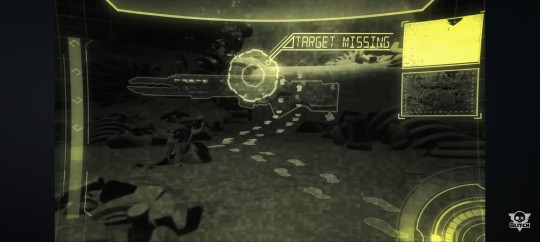
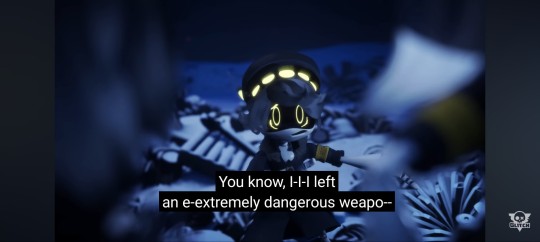

He only goes AFTER Uzi after he realizes that she's made off with the weapon that took his head off. Yes, she missed and he was able to regenerate, but if Uzi had hit just a little bit lower, she would have hit his core - which would have permakilled him. Surely realizing this, he runs off and attacks the bunker with what given reason?
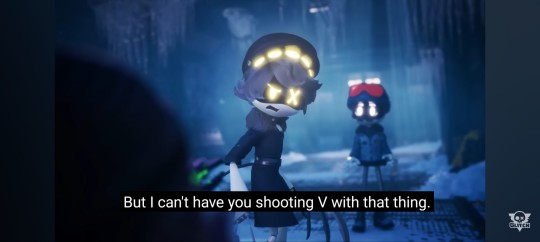
It wasn't about him. It was NEVER about him. It was about V. He wanted to keep HER safe, he wanted to make sure Uzi wouldn't shoot HER with that gun. Now, why all the unecessary carnage then? In THIS case, I think he defaulted to wanting to be useful and thus making all of the kills that he did. Though, it could also be argued just as fairly that he was consuming so much oil/matter to ensure that if she DID shoot him again, he would be able to get back up faster. The gun has a cool down, yes, but I don't know if he knew that. Or if he did, he couldn't have known that it only lasted for 30 minutes. Now about that fighting style I mentioned - this is why I think the reasoning here was purely for utility: N appears to have a very cut-and-run fighting style. If he has a choice, he doesn't prolong his kills - the first guy he stabs through the chest then immediately takes his head off, the second dies via missile, the third N just tackles and kills himself (we only hear the guy scream fir a second before N is seen drinking oil from his neck, which leads me to believe that the death was quick), and Braxton dies via super accurate cutting-you-in-half laser (which was probably meant for Uzi, but he couldn't see them when he fired as he was too busy drinking, so he probably just latched onto the voice that he heard and fired). All deaths which were extremely fast and without any toying, despite the multitude of weapons used. Now to me, this implies that he has a style, and he sticks with it. And that style is just to /get the damn thing over with./
And that's it! Those are the only times we see him in worker kill mode. Now we do see him switch into a "general" kill mode when he takes "Tessa's" head off, but it's pretty plainly obvious that that took every ounce of his mental strength to do. I mean shit, he basically collapsed as soon as it was over and didn't regulate until Uzi took his hand. Now I guess it could be argued that that was "his friend" so of course he's more hesitant to kill her, but I think part of the reason it was So Hard is because he ALREADY doesn't favor killing, and now he has to behead the only human who ever showed him any kindness. AND THEN IT WASN'T EVEN HER, SO-
And don't bring up the episode 8 fight - OBVIOUSLY he's gonna fight to kill, he's recovering the memory of everything this thing has done to him and now he has two new motivators: love, and WRATH. I make exception for that fight because quite frankly if he WASN'T fighting to kill at that point I would be worried. Though I do wanna bring up that he was very obviously conflicted about the whole thing. And before you argue:

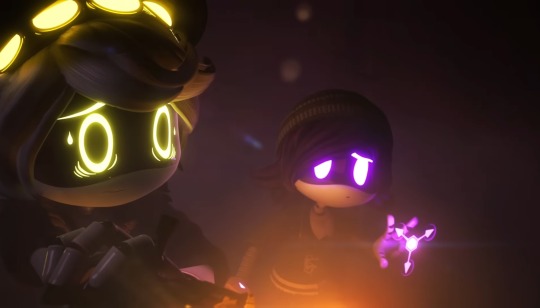
Even against THE SOLVER ITSELF, he was still incredibly conflicted about killing. Again, that used to be his friend (and is wearing the SKIN OF THE ACTUAL HUMAN HE THOUGHT HE KILLED NOT EVEN A CANON 20 MINUTES AGO FOR THEM), but even still, my earlier point of "already doesn't favor killing, forced to kill" still stands.
In conclusion - your honor, N is a sweetheart. Always has been, despite everything he's been forced to do. And the amount of guilt he probably feels for the oil (and blood, now that he remembers that) on his hands is probably so, so much. Too much. Why do you think he copes with repression and positivity?
*"Worker Kill Mode" specified because I acknowledge that he kind of has two kill modes - one where he's in control and one where he's Not, as the Solver's puppet.
#god I need to hug him Right Now#jesus christ I am so happy the finale went the way it did because if he didn't AT LEAST have Uzi at the end then he would not have been ok#anyway#murder drones#md#glitch productions#glitch#serial designation n#n is not okay#mymy rambles#character analysis i think??
61 notes
·
View notes
Text

drew some totally normal sadnesses
blank bg and individuals below the cut
edit: i posted some of my thoughts that went into these designs! if youd like to read you can find it in the reblogs







#in stars and time#isat#isat spoilers#isat fanart#isat siffrin#isat mirabelle#isat isabeau#isat odile#isat bonnie#isat loop#cw body horror#< just in case#aves art#two hats spoilers#im sorry if the names are awkward i dont speak french.....#might make a companion post to this detailing my thought process#because boy did i think#yes i know about mdp i love mdp . but i wanted to draw goopy freaks more in line with other sadness designs#this is like character analysis in the form of creature design
5K notes
·
View notes
Text
Learning that fans hated Applejack and called her "boring" is crazyyy to me because I genuinely, unironically believe AJ's the most complex character in the main six.
Backstory-wise, she was born into a family of famers/blue collar workers who helped found the town she lives in. She grew up a habitual liar until she had the bad habit traumatized outta her. She lost both her parents and was orphaned at a young age, having to step up as her baby sister's mother figure. She's the only person in the main gang who's experienced this level of loss and grief (A Royal Problem reveals that AJ dreams about memories of being held by her parents as a baby). She moved to Manhattan to live with her wealthy family members, only to realize she'll never fit in or be accepted, even amongst her own family. The earlier seasons imply she and her family had money problems too (In The Ticket Master, AJ wants to go to the gala to earn money to buy new farm equipment and afford hip surgery for her grandma).
Personality-wise, she's a total people-pleaser/steamroller (with an occasional savior complex) who places her self worth on her independence and usefulness for other people, causing her to become a complete workaholic. In Applebuck Season, AJ stops taking care of herself because of her obsessive responsibilities for others and becomes completely dysfunctional. In Apple Family Reunion, AJ has a tearful breakdown because in she thinks she dishonored her family and tarnished her reputation as a potential leader –– an expectation and anxiety that's directly tied to her deceased parents, as shown in the episode's ending scene. In The Last Roundup, AJ abandons her family and friends out of shame because believes she failed them by not earning 1st place in a rodeo competition. She completely spirals emotionally when she isn't able to fulfill her duties toward others. Her need to be the best manifests in intense pride and competitiveness when others challenge her. And when her pride's broken, she cowers and physically hides herself.
Moreover, it's strongly implied that AJ has a deep-seated anger. The comics explore her ranting outbursts more. EQG also obviously has AJ yelling at and insulting Rarity in a jealous fit just to hurt her feelings (with a line that I could write a whole dissection on). And I'm certain I read in a post somewhere that in a Gameloft event, AJ's negative traits are listed as anger.
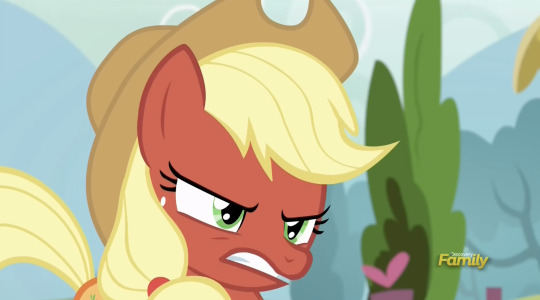
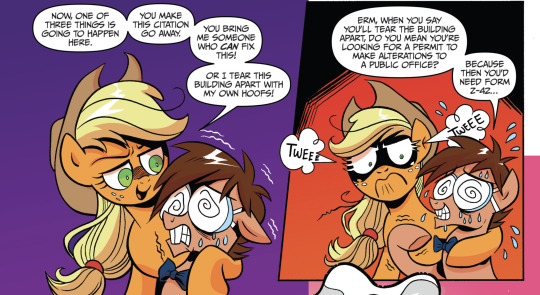
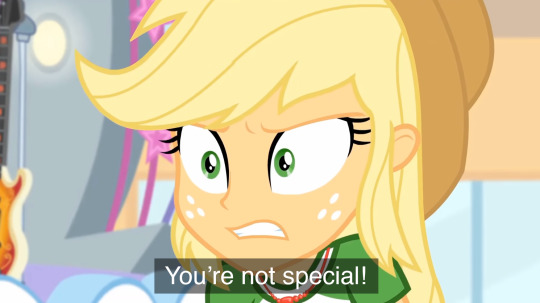
Subtextually, a lot of these flaws and anxieties can be (retroactively) linked to her parents' death, forcing her to grow up too quickly to become the adult/caregiver of the family (especially after her big brother becomes semiverbal). Notice how throughout the series, she's constantly acting as the "mom friend" of the group (despite everything, she manages to be the most emotionally mature of the bunch). Notice how AJ'll switch to a quieter, calmer tone when her friends are panicking and use soothing prompts and questions to talk them through their emotions/problems; something she'd definitely pick up while raising a child. Same with her stoicism and reluctance at crying or releasing emotions (something Pinkie explicitly points out). She also had a childhood relationship with Rara (which, if you were to give a queer reading, could easy be interpreted as her first 'aha' crush), who eventually left her life. (Interestingly enough, AJ also has an angry outburst with Rara for the same exact reasons as with EQG Rarity; jealous, upset that someone else is using and changing her). It's not hard to imagine an AJ with separation anxiety stemming from her mother and childhood friend/crush leaving. I'm also not above reading into AJ's relationship with her little sister (Y'all ever think about how AB never got to know her parents, even though she shares her father's colors and her mother's curly hair?).
AJ's stubbornness is a symptom of growing up too quickly as well. Who else to play with your baby sister when your brother goes nonverbal (not to discount Big Mac's role in raising AB)? Who else to wake up in the middle of the night to care for your crying baby sister when your grandma needs her rest? When you need to be 100% all the time for your family, you tend to become hard-stuck with a sense of moral superiority. You know what's best because you have to be your best because if you're aren't your best, then everything'll inevitably fall apart and it'll be your fault. And if you don't know what's best –– if you've been wrong the whole time –– that means you haven't been your best, which means you've failed the people who rely on you, which means you can't fulfill your role in the family/society, which makes you worthless . We've seen time and time again how this compulsive need to be right for the sake of others becomes self-destructive (Apple Family Reunion, Sound of Silence, all competitions against RD). We've seen in The Last Roundup how, when no longer at her best, AJ would rather remove herself from her community than confront them because she no longer feels of use to them.
But I guess it is kinda weird that AJ has "masculine" traits and isn't interested in men at all. It's totally justified that an aggressively straight, misogynistic male fandom would characterize her as a "boring background character." /s
At the time of writing this, it's 4:46AM.

#mlp#yeah i wrote this last night during insomnia.#yeah i know an embarrassing amount of crap about this kids show#but whatever it's my hyperfixation i'll store as much useless information as i want!!!#i'm gay and neurodivergent i have an excuse#in case you needed more proof that aj's my favorite character#personal#delete later#unless you like this analysis stuff#i get why they didn't reveal aj's parent's death until way later and why they didn't do much with it but i wish they did#cuz narratively there could've been so much material with aj's grief. like. i feel like we gloss over the fact that she lost her#mother and father as a teenager#i tried keeping my personal hcs out of this to keep it unbiased#but i'll put some in the tags#involving rarijack –– i think aj can be (but not always) very self-conscious about her relationship with rarity#anxieties that she's not the right fit or that rarity will move away and leave her some day or that another woman will take her attention#(like in rollercoaster of friendship?? nudge nudge??). basic seperation anxiety stuff#long post#regarding applebloom whenever i think about her and her parents i think about that scene in steven universe where steven looks up at#a portrait of his mother and openly wonders what kind of sack lunches she would've made for him. that episode still fucks me up
7K notes
·
View notes
Text

Was thinking about this line because Harrow what the actual fuck are you talking about, and I realised something.
Not only does Harrow really for real not know that Gideon loves her—in the bullshit context of their lives, this is a reasonable misunderstanding for her to have.
What has Harrow known Gideon's life goals to be since they were children? Hint: There are at least two Harrow is fully aware of.
The first is to be wanted. As much as Gideon hates and wants to escape the Ninth, she also paradoxically craves their acceptance. They're the only community she's ever known. Harrow plays on that desire from the very beginning, mostly by kind of .... well, okay, by negging her about it. Ironically appealing to her sense of loyalty and duty to her house when they both know Gideon never even had that bridge to burn. That kind of thing.
Whether or not she's right, Harrow sincerely believes that acceptance to still be important to Gideon. First flower of my house, the greatest cavalier we have ever produced. You are our triumph. The best of all of us. When Harrow has only seconds left to make amends, she not only banks hard into praising Gideon, she frames it to unambiguously offer Gideon the acceptance she's always been conspicuously denied. Assuring her of her value not just as a person or as a cavalier, but as one of their house, one of their people.
The second thing Harrow knows is that Gideon wants to join the Cohort. Easy, everybody knows that. She's only been telling everyone with ears (and then some) since she was eight years old. It's the bait Harrow dangled to entice her into this mess. She wants to be a hero, to do great deeds like in the comic books. She wants to be a soldier.
Against the backdrop of all that context, Gideon's dying declaration "for the Ninth" starts to sound a hell of a lot more like "for Queen and country." Especially when you remember that Harrow is still the sovereign ruler of the Ninth. From Harrow's vantage point, Gideon could easily be playing the heroic underdog in a war movie. The soldier no one believed in until she threw herself on a grenade to save her squad. The knight errant who proved her chivalry by giving her life in service to her king.
From that perspective, Harrow's line to Ortus makes sense. She's following through on her promise of acceptance, defending Gideon's loyalty to the first Ninth face she sees. She's playing out Gideon's war hero fantasy, where Gideon's act of heroism proved them all wrong about her. In which case Ortus's response, "You are the most worthy heroes the Ninth House could muster. I truly believe that," flows very naturally as a reply. He understands what Harrow is trying to say, and affirms it.
It's not a hero's burial in the Anastasian, but it's the closest thing Harrow has the power to give her. And it's a fucking reasonable interpretation of Gideon's actions that doesn't touch on her feelings for Harrow at all. Fuck me.
#the locked tomb#griddlehark#harrow the ninth#don't mind me just. still dissecting these characters to figure out what is even going on in there#this series is the most satisfying exercise in limited perspective I've ever encountered#no one is on the same page but all their pages are coherent#god I love mess#tlt meta#tlt character analysis#gideon nav#harrow nonagesimus#harrowhark nonagesimus#and it's not really relevent here bc this is about Harrow's understanding of events but#I think she's right about Gideon and the Ninth#Gideon said ''for the ninth'' as she died which she very much didn't have to do#and. well. no spoilers past htn in this post so no spoilers past htn in these tags
1K notes
·
View notes
Text
Guess who made even more of these stupid things
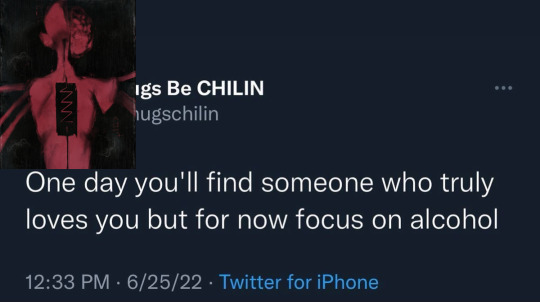






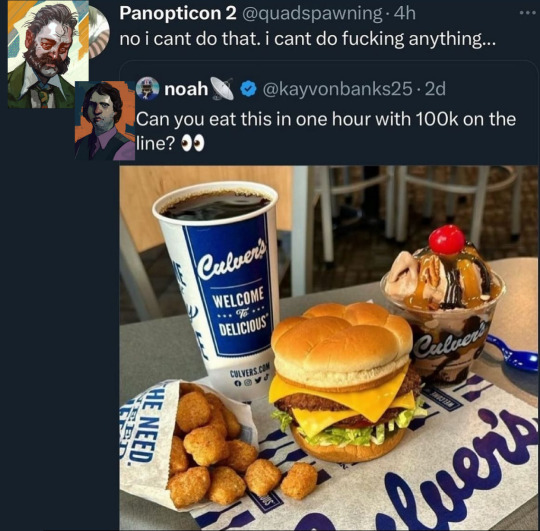


#it’s all I’m good at I guess#this and the occasional character/lore analysis#I’m not sure about some of these but whatever#I tried to include more variety but the same couple freaks kept applying#disco elysium#harry du bois#jean vicquemare#judit minot#kim kisturagi#trant heidelstam#steban the student communist#he has a tag???#lawrence garte#fuckass name#lawrence#klaasje amandou#cuno de ruyter#cunoesse#she has a last name I think but I don’t remember it#kimharry#does this count#I’ll tag it anyway#call me mañana
2K notes
·
View notes
Text

Kageyama's backstory only being revealed near the very end of the series is really interesting from a meta perspective.
For reference, his chapter is 387 out of 402. That's 96% of the way in.
To contrast, other characters like Tsukishima and Yamaguchi's backstories are shown in Chapters 87-88.
Now, we do get the explanation for his "King of the Court" title in Chapter 6, at the start of the series, but we don't see how he got to that point, or why he started playing volleyball in the first place like Tsukishima's and Yamaguchi's stories show.
It creates this situation where, despite being the deuteragonist, the character our protagonist, Hinata, is practically glued to the entire series, we barely know anything about him.
We don't even know he has a sister until that point whereas other characters' siblings like Natsu, Saeko, Akiteru, Alisa have all made appearances way before then. Even Oikawa's sister, though we don't see her, we at least know she exists because of Takeru.
He's both closed off to us (the audience) as well as the other characters in the series, and this results in them finding him rude or disliking his character in general (see: the "Kageyama is abusive" discourse that somehow keeps popping up even now).
Chapter 387 takes place in 2018 and was published in 2020 so it takes him 6 years of in-universe time and 8 years of irl time to really open up.
And the catalyst for all of this is Hinata fulfilling his promise of beating him.
You see, another thing to note is that, whenever Hinata thinks of Kageyama, he's always looking at him from behind.

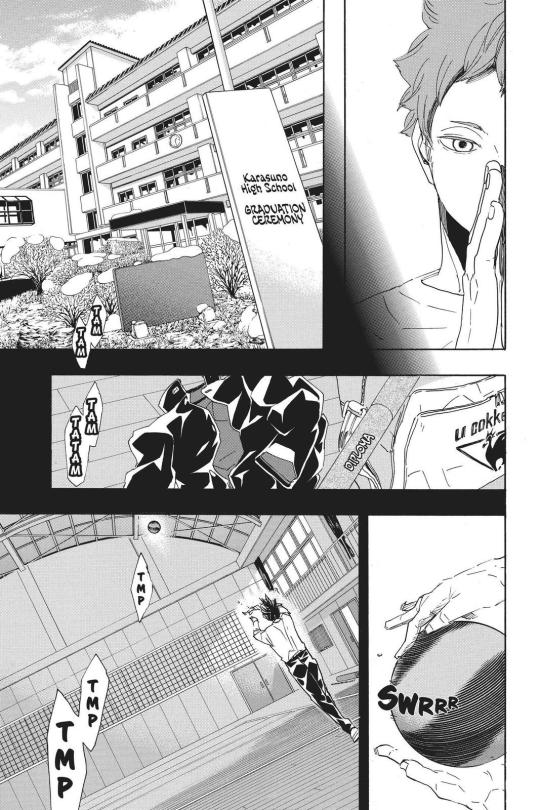
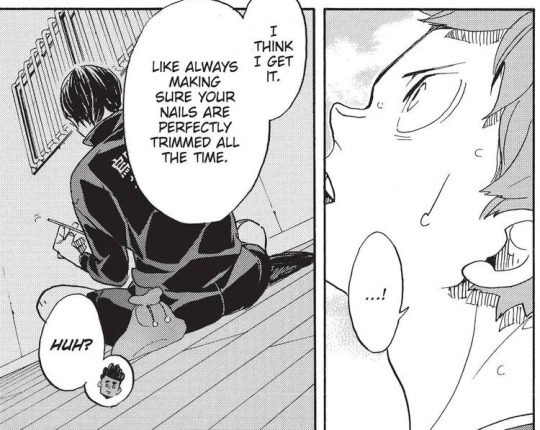
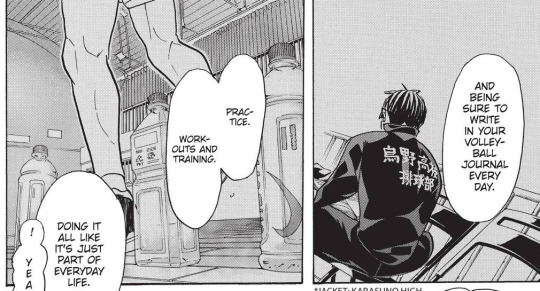
His internal image of him is someone who's always up ahead, someone he needs to catch up to, meaning Hinata can only see one side of him, he cannot see all of Kageyama until he catches up and passes him.
Which he finally does here.
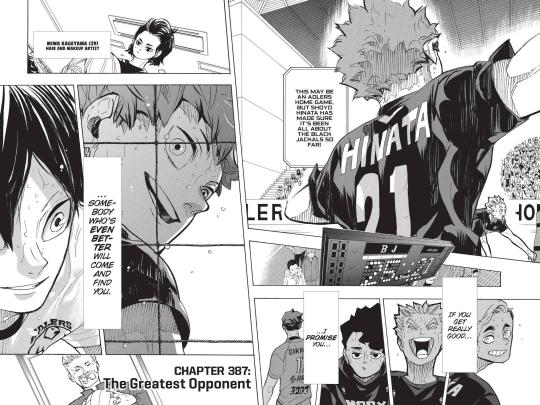
In this shot Hinata is finally the one who's looking back at Kageyama. At this moment, Hinata (and by extension the audience) can see him for all he is, can see how he was just a lonely boy who's been waiting for someone to meet him where he is, to keep running alongside him and not quit the race.







Someone he doesn't have to go easy on. Someone who would actually tell him to hurry up instead of slow down for a change.
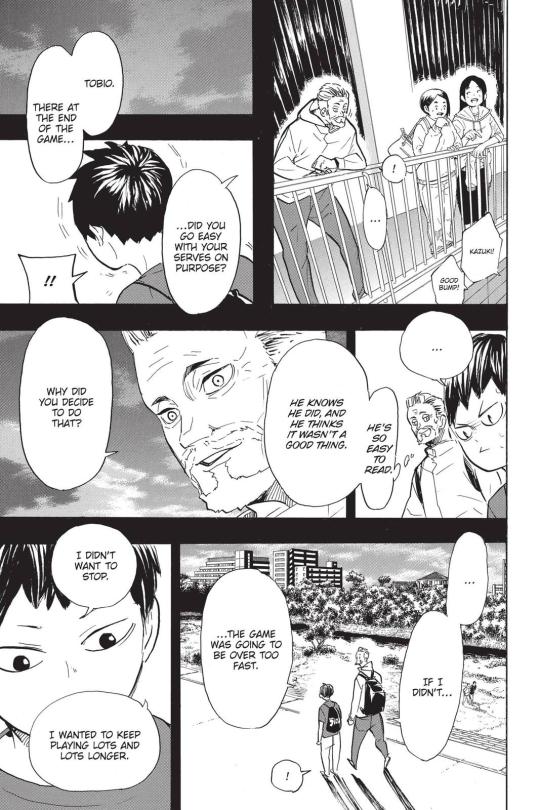
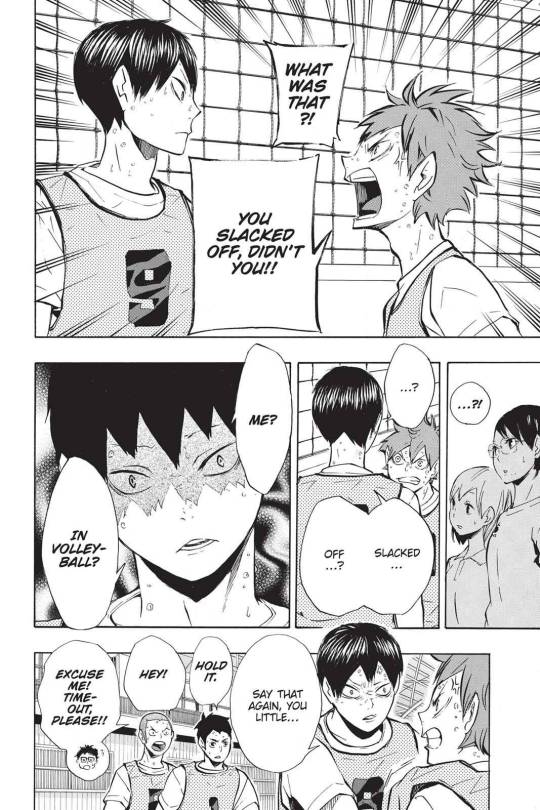
His someone better.


#toast post#haikyuu!!#kageyama tobio#character analysis#? it feels so pretentious of me to call this wall of yapping that 😭 but i feel i need a separate tag for these longer posts#i actually talked a bit about this on my twt and i think it sounded better there lol but i wanted to expand my thoughts a little#and also include more pics#hinata shouyou#kagehina
2K notes
·
View notes
Text
i have suddenly become obsessed with a theme that HoO established but never proceeded to extrapolate on, which is:
You are Percy Jackson, and you have been swapped with a boy who was allegedly everyone's favorite person, but they have decided to replace him with you. They just met you. You stand next to his best friend and the people he's known his entire life. In his home. In his cloak. In his place. They stopped looking for him.
You are Jason Grace, and you have just found out you have a long lost sister who completely replaced you in her life with this girl you just met. Your lives and personalities are mirrors. She is you, living the life you were robbed of.
You are Annabeth Chase, and you have just become starkly aware that you have been inhabiting the void left behind by your best friend's long lost brother. You and Luke were just replacements for him. Now you have to look him in the eyes when he has nothing and know you took that life from him.
You are Piper McLean, and you have just found out your relationship is fake and built entirely on the memories of Annabeth Chase. You have been given a boyfriend when hers has been taken away. You have no idea how much of it is real or not but regardless you feel like if your relationship isn't exactly in their image that you have failed.
You are Leo Valdez, and you have just learned that you are the echo of your great-grandfather. You are not your own person. You just exist to be a mirror of him. A doppelganger. An actor and stunt double facing all the danger he never had to but wearing his face. To be there for his best friend decades later simply because he couldn't. You are playing a role. A seventh wheel and a pawn for a goddess who carefully sculpted your entire life for her own purposes.
You are Hazel Levesque, and the only reason you are alive is because your brother couldn't save your his sister. You are a consolation prize. An apology. Your existence here is misplaced in every way but you inhabit it anyways.
You are Frank Zhang, and you are a shapeshifter. Inhabiting your own body feels strange and clumsy when you could be literally anything at any time. You are anything and everything and live your life with the simple certainty of knowing exactly how you will die.
#pjo#hoo#heroes of olympus#percy jackson#riordanverse#jason grace#annabeth chase#piper mclean#leo valdez#hazel levesque#frank zhang#meta#analysis#me shaking hoo: what if we actually address the interpersonal dynamics of the characters. please. please. please. please.#frank is the only person on the boat not having an identity crisis tied to another member of the crew somehow and that is FASCINATING#but also WHERE is all the interpersonal literally anything. hello. please. making grabby hands. everybody identity crisis go.#i wanna see the entire argo ii crew stumbling through trying to figure out their places and senses of self!!!!!#particularly in relation to each other!!!!! we get snippets but we rarely ever get the full thing or a resolution!!!#like. HELLO??? Piper acknowledging that her relationship with Jason is artificially sculpted in the image of Annabeth and Percy???#and that her ideals of what Jason and her can be are just that she feels like they need to be like what Percy and Annabeth have????#and thats just DROPPED COMPLETELY????#poor Jason is getting replaced twice. Leo is not his own person.#Hazel at least gets the resolution that Nico does not truly see her as a consolation prize#but Annabeth gets to be hit with the like EIGHT YEAR DELAY of learning the place she inhabits in Thalia's life is the echo of someone else#cause like. yeah she knew Thalia had lost her brother but i dont think it clicked for her until she met Jason that oh. she *replaced* him#Frank at least has some certainty about his identity in one aspect (his curse). everybody else is floundering a bit#except for maybe Percy but its kind of the camps of ''i replaced this person and it weighs on me'' versus ''i have been replaced''
3K notes
·
View notes
Text
OK correct me if I'm wrong, but I feel like the main 'yin/yang' parallel with Atsushi and Akutagawa is not something like 'this one is bad but secretly has a good side and this one is good but secretly has a bad side'.
I feel like it's more about 'who they are at their core vs who they choose to be'.
At his core Akutagawa is kind and at his core Atsushi is not. But despite this Atsushi tries every day to make the kinder choices and I love him so much for it. He has to work so hard to be good.
He wants to be a bitch SO bad I know he does but he tries his best to help people and be nice (sometimes he fails but that's OK <3)
Atsushi doesn't always WANT to help people, a lot of the time he's selfish and scared, but he does help people anyway. He keeps helping people over and over again. There's still some selfish motivation to it, and his initial motivation for helping people was because the headmaster told him that's all he was worth, but overall he does care about the people he helps and it weighs on him if he fails to save them. And of course, as the series goes on he starts helping people more because he can rather than because he feels like he needs to.
In Akutagawa's case, he's still capable of being kind but his environment led him into being someone who chooses to hurt people. But he's always been a protector at heart. In the start he was bad compared to Atsushi because he was choosing to hurt people and keep the cycle of abuse going. Just like how Atsushi developed in why he saved people, Akutagawa starts to get redeemed when he chooses to not just act on his rage. Not only does he start to spare people, but he speaks more kindly to them (apologising to Higuchi and telling Kyouka he's proud of her). It all culminates into the moment he chooses to help Atsushi and sacrifice himself for him, going back to his core value of being a protector. Even when he's finally revived, he keeps this role in his new position as Aya's Knight.
I kind of see the streaks of white in Akutagawa and the streaks of black in Atsushi not as their 'hidden sides' but as their fundamental selfs. That's who they are at their core, and their main colours (black for Akutagawa and white for Atsushi) are how they're presented to everyone else and how they try to have people see them as.
#I'm just spitballing half of this but these are also my genuine thoughts on these two and their yin/yang parallels#I'll never get over Akutagawa being a protector at heart and getting that side of him buried with rage from growing up in the PM and-#-Dazai's old teachings#also Atsushi being selfish at his core is very important to me. He's not a typical 'kind hearted' shonen protagonist. He's kind not because#-that's how he’s always been but because that's how he chooses to be#I think that kind of character is even more admirable to me#it also fits well with Dazai being his mentor. Since Dazai also doesn't have that initial desire to save people just out of kindness.#He saves people as a promise to his dead friend that wanted him to live a good life#in fact that actually fits with Jouno too#now that I think about it quite a few bsd characters fit into that 'not kind because they were born that way but because they chose to be'-#-archetype#hell yeah. That's kinda cool I like that#bsd analysis#Akutagawa#atsushi#akutagawa ryuunosuke#atsushi nakajima#sskk#shin soukoku#<- Not a ship post but adding this tag since I consider that their duo name too#bsd#bungou stray dogs#bungobble my post
1K notes
·
View notes
Text
some thoughts wrt the two established "romances" in severance so far (burt/irving and helly/mark) inspired by @figmentof who pointed out how irving had to find out mark and helly kissed from the corporate video in s2 e1 and how he must have felt seeing his co-workers' love affair like portrayed like that, and how it ties into the queer narrative at play here which uses workplace dynamics and policies as very clear analogues for real-life prejudice against queer couples. I mean, just look at this:
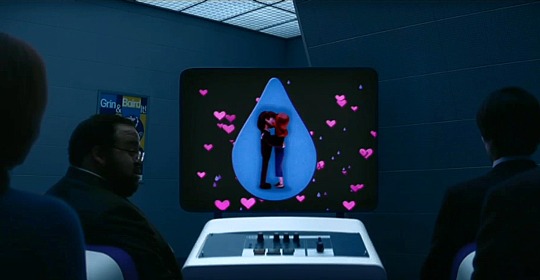
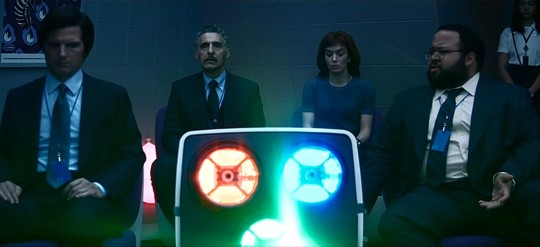
it's not just documented, but celebrated. used as propaganda for how the conditions on the severance floor have improved. proof that the severed workers are happy. and how even though he is unaware of the sociopolitical meaning of all this, lumon is very not-subtly telling him that what he had with burt is inherently lower and less valuable than this.
irving doesn't even know homophobia exists and yet he is still affected by it, it still seeps into every corner of the way his and burt's romance progresses. burt is positioned as an unacceptable love interest from the jump. irv is actively discouraged at every turn from pursuing it. their friendship is viewed with disgust and apprehension from their coworkers. burt working in a different department that's hated by MDR. dylan himself not being homophobic in the sense he opposes their relationship because they're both men but his attempts to keep them apart still has a parallel sort of prejudice behind it and still ultimately has the same effect as if it WERE driven by homophobia. irving is made to feel perverse for wanting contact with burt. he's told this is for his own good.
and then, just as they manage to overcome that immediate resistance from their peers and escape to a place where they can explore this blossoming romance on their own terms, burt retires. for all it matters to irv, he's dead. and then irving is given the option to live the rest of his life with grief that will never heal, or kill himself too, because there is no reality where they get to be together. that's just the way things are. of course they wouldn't get to be together. he was unreasonable and childish for ever hoping that could happen. this is just the way it goes for innies. he's told to get ahold of himself and not make a scene.
but the thing is, the standards are not the same for all. a heterosexual romance gets upheld as the shining example of success and fulfilment for the severed employees, whilst a homosexual romance is ridiculed and invalidated, and written off as something that was simply never meant to be. and even more importantly to irving, a heterosexual romance is APPROVED OF by lumon, and by extension, by kier. irv held back from allowing himself to even call his and burt's relationship a romance, because his god had told him it was wrong, he followed the handbook, thinking this was what kier wanted, and then finding out after suffering the worst heartbreak imaginable because of it, that this WASN'T EVEN TRUE. it's simply just that someone like HIM doesn't get to have something like this. his love is not the kind of love god wants. he does not approve of irv's love. cynical and manipulative though that approval may be (even within the context of the corporate video, the helly/mark romance is only being celebrated to further the narrative that lumon care for their workers, but the point still remains that it was THEIR romance specifically used to suit this end), when your entire life has been in pursuit of that approval, it must be devastating to learn it was never on the cards for you.
he and burt even used the fact kier met and fell in love with his wife in the same circumstances as them to justify this to each other - and they were RIGHT, god does approve of falling in love with your coworkers - this simply just doesn't apply to them specifically. and if irving needed any more proof that he no longer has a place at lumon, that he's better off not existing at all than existing with this pain that cannot be remedied, pain that won't even be acknowledged for what it is, a symptom of a sickness which plagues the entire severance system, pain that he is simply expected to choke down and get over - this is that proof.
and that's the POINT. they're TELLING us that this is unjust, and there's a double standard. they're using the ways the innies experience romance and the difference in lumon's reaction (lumon being the collective of all the management we've seen, lumon as a singular entity) to burt/irving vs helly/mark to comment on how queer people are not afforded the same level of respect or validation IN REAL LIFE, for their attachments, their love, their pain, their suffering. it is NOT just incidental that irving's romance is with a man. it would not WORK if his love interest was a woman. the POINT is that they are both men and how that puts them at a disadvantage, even if they aren't aware of the prejudices of the outside world, even if they don't TECHNICALLY apply on the severance floor, there are very clear analogues which still end up oppressing them in equivalent ways that they would be suffering if this were a normal workplace in the outside world.
it genuinely sickens me to my stomach that even in a world so divorced from reality and the sensibilities of regular society, a queer couple is still made to suffer and feel inferior in a way that perfectly mirrors their real-life counterparts. how they will never, EVER be allowed to exist in a world where their love could thrive freely and uninhibited - they never get to taste the joy our world has to offer people like them, but they are still somehow subjected to all the pain it has to offer them regardless. it's such horrifically devastating writing. it makes my skin crawl. I can't stop thinking about it
#TO BE CLEAR i am not trying to claim that lumon do genuinely want helly and mark to be a couple#they very begrudgingly co-opted this display of affection and camaraderie to suit their own ends#like i say. the approval is cynical. its purely utilitarian.#however the fact it CAN be used to further their narrative that severance is a good thing#whilst severance itself has brought nothing but pain to irv and his romantic endeavours#is very telling. its very fucking telling#especially from irvs perspective specifically here. this is how HE'D see it#as someone who puts so much stock in what kier would think of him. someone who based his entire identity#on following his doctrine to the letter. how he would see the one real true thing hes ever experienced written off like this#whilst another couple is inexplicably celebrated. i mean just look at his dead eyed stare in that sc.#this broke him. this was his final straw#anyways im not nearly intelligent or well read enough to do a thorough analysis on exactly how#religion plays into irvs mindset and his character arc#these are just thoughts on the hypocrisy shown by lumon on the romance thing specifically#clocking into writing meta for this show like its a 9-5. its so serious.#severance#severance spoilers#severance season 2#meta tag#wails from the abyss#irving bailiff#burt x irving
554 notes
·
View notes
Note
How I like to characterize Sprout is that he’s great talking with the ones he’s close with (Cosmo, Astro, etc.) But incredibly socially awkward with others. He comes off as brash, but he’s trying his best.
What guidelines do you try to follow when writing Sprout? I’m just curious.
Thanks for giving me the opportunity to yap about one of my favourite characters hehe..
You asked for guidelines I gave you a character analysis instead.

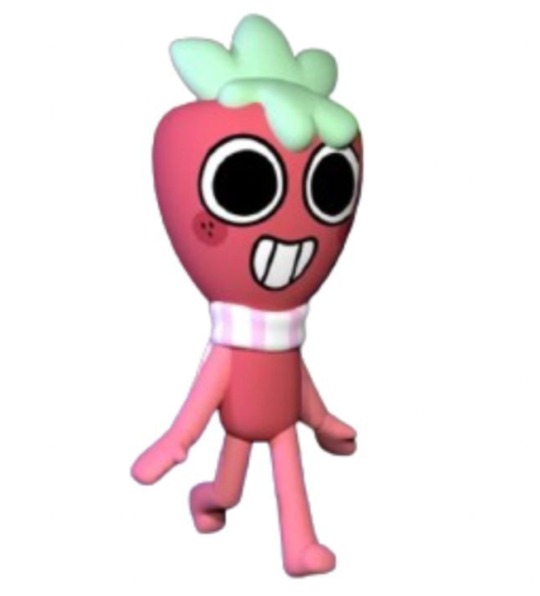

(Don't mind the images I didn't want this post to look naked)
ALSO NOTE THAT AT THE END OF THE DAY THIS IS MERELY MY INTERPRETATION OF HIS CHARACTER. EVERYONE HAS THEIR OWN!! Don't take my post as a mandatory guide to follow.
Let's talk about what's canon:
I like checking the Wikipedia for his dialogues every now and then to make sure he's not too out-of-character.
Sprout comes off as blunt, he does not sugarcoat his words when he has something to say.
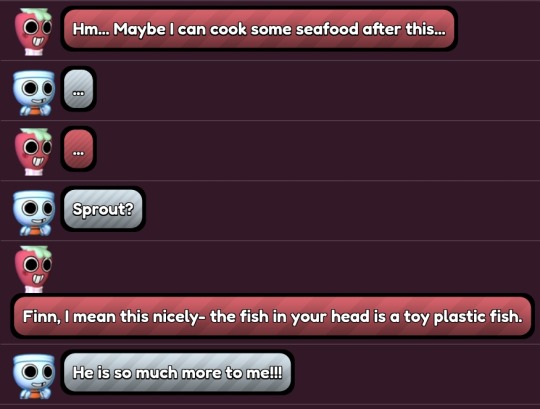
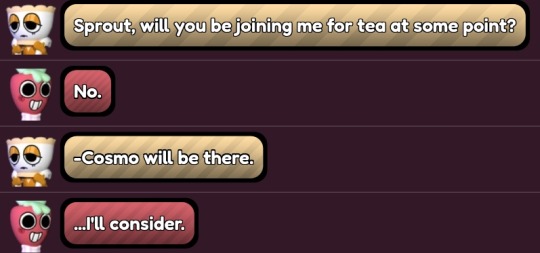
Not even an excuse or a reason as to why he doesn't want to join Teagan for tea; It was straight up a "no" until Teagan told him Cosmo will join them too. (Also I want to point out he doesn't immediately say yes when he's told Cosmo will be there, so for all we know he'd still decline even if his best friend's joining Teagan).

Dandy's dialogue when you purchase Sprout. I think about it a lot. Out of all the character dialogues, the one with Astro is what I feel like is an example of his overprotectiveness coming across as "pushy".
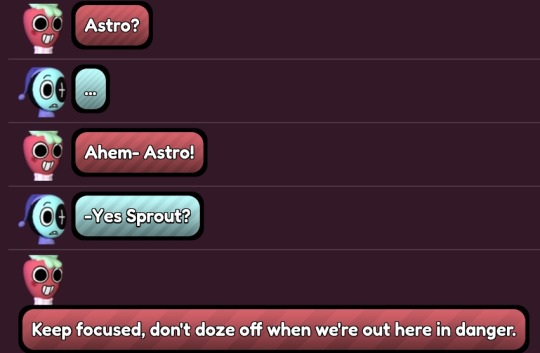
He'd definitely be the type to scold his friends. Especially after Gardenview's shutdown with all the Twisteds wreaking havoc and whatnot. I don't think Sprout is fond of going on runs, but only does so he can watch over everyone and keep them safe. He makes sure everyone is focused and on high alert, he doesn't want anyone to be reckless.
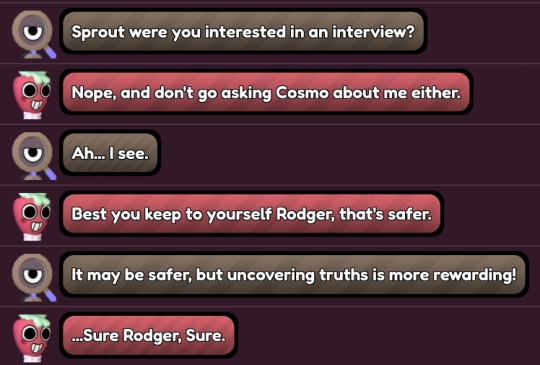
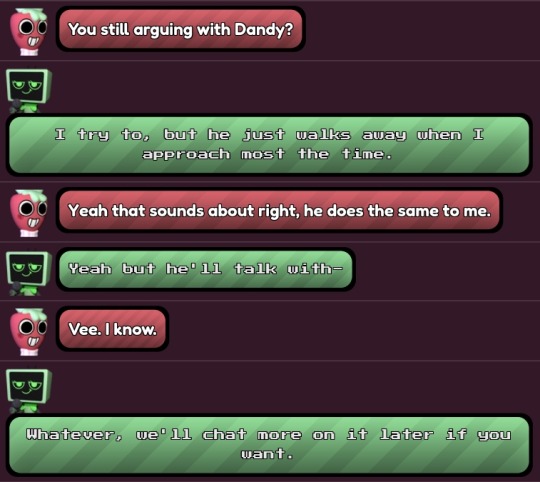
He prioritizes safety over answers. His dialogue with Rodger shows that. Maybe he's also curious as to what has happened, because in Vee's dialogue he tried talking to Dandy only for Dandy to walk away. I assume Sprout just wanted to check up on him rather than knowing what's going on with Gardenview and the Twisteds.
Another thing I don't really see often is how Sprout is actually pretty forgetful and impulsive.


For a Toon who's constantly keeping watch on everyone he surely does not apply the same kind of attention to himself.

He talks before thinking about his words, but once he realized that he immediately apologized to Vee. I don't think he always notices when he comes across as rude though.

I actually think he's actually quite reckless when he bakes. I obviously can't show it in this post but if you look at that animation with Cosmo and Sprout baking they're not even measuring the ingredients. I mean what. 😭
The way he bakes feels so impulsive and it just looked like they were winging it. Somehow despite that their baked goods still end up great and that's honestly impressive.
Okay now for that dialogue between Bobette and Sprout, I was getting there-- I've never made a gingerbread house but from what I've seen from other people it requires a lot more patience and carefulness.
Sprout is neither.
According to him, his gingerbread house fell apart immediately and then he stopped trying afterwards. It's honestly funny.
I feel like this also shows through his stats. Both his extraction speed and skillcheck is 2 stars. His stamina and speed is way higher. He prefers running around, probably to make sure he can watch over everyone during their runs. That or because he has long legs.
Anyway to recap; Sprout in canon is blunt, pushy, overprotective, and impulsive. But he genuinely has good intentions and means well. He cares for his friends, which is why he scolds them because he wants to make sure they're safe.
Now for some headcanons:
Okay this is the part where I make stuff up. So it's just my take;
• He has ADHD.
I'M STARTING WITH THE NEURODIVERGENT HEADCANON.
This is not a unique headcanon. I've seen so many people who headcanons this too so it's relatively popular. Personally, I only see him with ADHD. (I'm projecting).
He's forgetful, impulsive, and quite socially awkward in a way aswell. He's easily distracted. He keeps forgetting about the oven. He's impulsive when baking. I'm a very impulsive and reckless person myself, I constantly make mistakes when I draw, yet somehow they end up okay 😭. When I'm not able to draw something right, I give up immediately. (I projected this onto the gingerbread house thing earlier).
• He comes across as intimidating.
You know in Kids' birthday parties when there's a mascot a lotta kids go run and hide? I based it off of that. I remember when I was like, 6 or 7, when a mascot came in I cried and hid under a table. They were tall.. <\3
I feel like there was a concerning number of kids who were actually afraid of him, despite how friendly he appears both in person and in the show. Maybe it's the RBF when he's not smiling..
I also like to think he's taller than some of the kids who comes to Gardenview which plays a factor to the whole "intimidating" thing. The way Sprout deals with this is giving the kids cupcakes or other sweets. Once the kids actually talk to him they're immediately comfortable.
• He was one of the very first to become "Twisted".
I don't have a concrete idea on how the story of the game goes, but I always imagine the Mains being the first victims. Sprout is a healer and he keeps an eye on everyone, so he had to go first.
–
Okay, I think that's all now. If you read all of that wow thanks, this took me hours to write 😭. I love overanalysing characters.

#ask#rambles#can you tell i think about him a lot#Sorry asker this might not what you've expected#But I needed an excuse to start yapping about Sprout and his character cause it's so interesting#I might have missed a lot of other details tbh#Oh well!#Anyway bonus headcanon Filipino Sprout.#No evidence no basis no proof I just want him to be Filipino cause I am too#This was genuinely so fun to do tbh#if you guys like these posts I can try making them for other characters too#dandys world#dandy's world#dandys world sprout#dandys world analysis#dandys world headcanon#dandys world hcs#character analysis
491 notes
·
View notes
Text
Okay so I rewatched all of MD last night and I have to say. I might be going back on a previous post.
OKAY LISTEN, I AM EXTREMELY INTERESTED IN KHAN AND NORI'S PAST. So I payed a little extra attention last night and two quotes caught my eye:
Ep. 2: "Yes. On that 'kill all humans' kick like when I was younger! (...)"
Ep. 4: "After the core collapse... I didn't notice the collars. Only your mom being a catch."
So basically I had a theory for how Khan and Nori met, which was something along the lines of "he found her in a conference room while she was waiting to be interviewed post torture session probably fixing something and slowly but surely feelings were developed" but a big part of that was her telling Khan what she was doing in that room. Now I'm not saying it's impossible that she did, but if he "didn't notice the collars," did he know?? That she was experimented on??? Like again he wouldn't necessarily have to see the collar for her to tell him "hey they did some shit to me that would have made OSHA cry" but I'm just. I'm thinking about it. BECAUSE, because, I have a little theory that she must have broke one day and told him everything about what they were doing to her and THAT'S when Khan had his "kill all humans" kick. It certainly wouldn't be appropriate for him to have it AFTER the core collapse, would it? Genuinely - I know it could be said that he must have known about Earth and therefore even after the collapse he might have had Uzi's mindset of "they're still out there and they have to pay," but like,,,, what would have made him so bitter?
I'm not denying that ANY drone under JC Jenson's operating parameters probably hated them, but when we saw him Khan didn't even shoot the thing he had been fearing/hating for YEARS since Nori's death. I get the circumstances are a little different there, but I feel like it wouldn't be WRONG to assume that most of the time, he builds his way out of tough situations. So that leads me to ask again: if not for Nori telling him about all the Shit, why and when did he have a "kill all humans" phase?
Basically all this to say I'm going to choose to believe that my interpretation of them meeting is correct unless God himself (Liam Vickers) tells me otherwise and I'm also going to choose to believe that he knew she was an experiment, he just deadass never noticed her collar.
Which would be hilarious. Think about it:
Uzi: *is born*
Nori: Aww, look at you! Little mini me! *takes off collar* oh this is gonna look so cute on you when you have a real body-
Khan: ...What is that?
Nori: What's what?
Khan: That, that thing you took off your neck. When did you get that?
Nori:
Khan:
*It was at this moment Uzi decided she hated him* LMAO
#I will be content to maintain my canon about how Nori and Khan met#Unless Liam Vickers literally tells me otherwise#They met in those labs and YOU CAN'T CONVINCE ME OTHERWISE#anyway#murder drones#md#uzi doorman#khan doorman#nori doorman#doorman family#character analysis i think??#glitch productions#glitch
62 notes
·
View notes
Text
“anri cares about the blue lock boys” “anri is like a mother/sister figure to the blue lock boys” “anri is kind to the blue lock boys” meanwhile this is anri with kunigami:
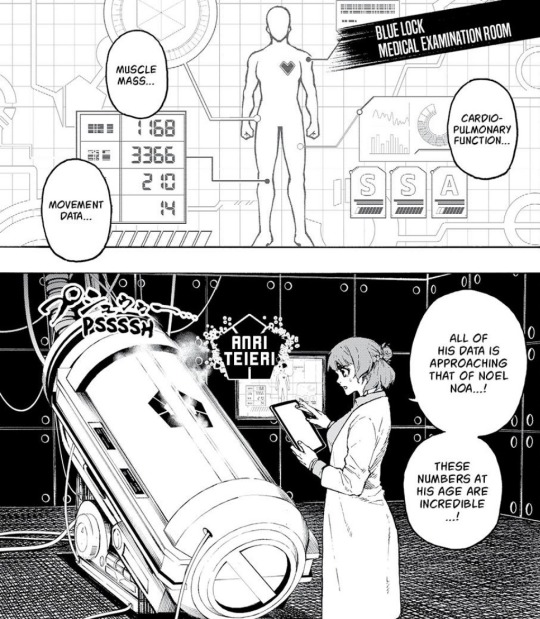
SHE DOES NOTTTTT GAF ABOUT THEM 😭 they are a means to an end for her!! obviously she doesn’t hate them and of course she was happy they beat the u20s but let’s think critically here…was she truly proud of them as people or was she just happy that the program wouldn’t be shut down??
the narrative (especially via her interactions with ego) treats anri as someone very naive and dumb, but blue lock and hiring ego were HER idea. everything that has happened to the boys is a direct consequence of HER actions, decisions, and dreams of japan winning a world cup. let’s not forget she’s also only 3 years older than aiku, kaiser, and sendou — she has no interest in taking care of a bunch of insane high-school-aged soccer freaks, she literally just wants her country to win the wc because she herself is a soccer freak!!
#anri is not a good person but she is infinitely more interesting and a better character when you realize that#unfortunately i think kaneshiro is allergic to women so i doubt she’ll ever get the depth she deserves#but she deserves better and i wish more people saw her for who she actually is!!#teieri anri#kunigami rensuke#<- since he cameos in the post JFJDSJ#bllk#bllk analysis#<- bye i hate tagging stuff with that tag it makes me feel pretentious esp because i never post anything serious ever
754 notes
·
View notes
Text
I feel like a lot of people forget that the Van Dir Linde gang was actually famous in their universe- Dutch Van Dir Linde was as famous as the real life Butch Cassidy. The gang had as much infamy as the Wild Bunch or the Dalton gang. Arthur Morgan, John Marston, Bill Williamson, Javier Esculla, Lenny Summers, Charles Smith, Sean McGuire and more were probably as famous as the real life Doc Holliday, Jesse James, Black Bart, Rufus Buck, Ike Clanton, the Sundance Kid, Wild Bill Hickock, and more.
Sadie Adler would've been just as famous. She was a gunslinger like the real life Calamity Jane and Anne Oakley and she was an outlaw at one point like Laura Bullion, Pearl Hart, Belle Star, The Cassidy Sisters, and more.
The other women of the camp would've probably been less popular but still very intriguing figures to people in the future.
In the newspapers, we see that there are songs about Dutch's boys and books too. Trelawny mentions them being on dime novels. In the future, the pieced together story of the Van Dir Linde gang might've gotten adapted into a movie, similar to "Butch Cassidy and the Sun Dance Kid" or "The Assassination of Jesse James by the Coward Robert Ford". They could've gotten biopics, documentaries, and more.
Historians and fans of the wild West era would dig up records, find pictures, and maybe even track down people who were apart of the gang, accomplices to the gang, or victims of the gang. They would try to piece together stories to figure out the mystery of what actually happened to the gang.
People would argue over things that happened in the gang and have their evidence to back it up. Letters written by gang members would become so valuable. If they ever someone come across Arthur's journal, it would probably be considered one of the most valuable pieces of documentation to ever exist for that time period.
The guns of the gang would probably be kept in museums if found. Albert Mason's portrait of Arthur Morgan would be found in history books, same as other pictures.
Dutch would probably be a very controversial figure in history- some would hail him as a failed hero and others would condemn his violence no matter the reason- they wouldn't know what the people in the gang knew- especially in the end. Same with the rest of the gang members.
They'd probably all get romanticized. Hosea and Dutch's friendship, the raising of the boys, Dutch and Annabelle and his fued with Colm, Mary and Arthur, John and his family, Javier being a revolutionary- no one would know the full story.
And then there is Jack- he may live to see the 1960s and 70s and 80s. He may have grandchildren who'd pull him into a theater to watch a retelling of the gang that he was a part of at one point. He'd be amused. He'd think that the actor playing his father was too clean looking, too pretty. He'd think that the movie Arthur was too skinny. He'd think that the man playing Dutch had a funny voice as he tried to mimic the accent. He'd laugh and make notes in his head of the historical accuracy. He'd feel sorrowful at the deaths of the characters- he knew them at some point. And no one at the theater would know that the old man with the rowdy bright eyed boys who brought him there was Jack Marston, the last of the Van Dir Linde gang.
Jack might talk about it to the public. He might do interviews. He might even write a book about his father, the infamous John Marston. Those would be priceless. Even Beecher's Hope might be kept around and visited as a historical site for history goers.
And honestly? It is such a bittersweet thing.
#rdr2#red dead redemption 2#red dead redemption#rdr#arthur morgan#john marston#dutch van der linde#sean maguire#lenny summers#javier escuella#bill williamson#sadie adler#susan grimshaw#tilly jackson#karen jones#mary beth gaskill#abigail marston#mary linton#jack marston#history#wild west#story analysis#character analysis#i love thinking about this so much#it makes me both super happy and super sad.
2K notes
·
View notes
Text
I've been rotating this scene in my head for a very long time and I think very few people talked about it not just in terms of “look Copia’s so cute here” but in the context of character analysis. Because right up to this point, Copia behaves like an arrogant bitch and demands attention and validation from Sister, while considering himself as her equal.
But AS SOON as she hints that Copia is not doing what he should be doing (isn’t thinking about the show), he turns into a closed child who is afraid of being scolded by his mother. He immediately closes in on himself (eyes down, nervously fixing his hair to look like a professional, voice much less imposing, he os almost whispering) and shamefully tries to justify himself and I think this says a lot about how traumatized he is and how afraid he actually is of his possibly imminent demise
#honestly this scene never leaves my mind#i think that it says SO MUCH about dynamic between them#the band ghost#ghost band#ghost movie#ghost rite here rite now#rite here rite now#character analysis#ghost papa emeritus#papa emeritus iv#ghost rhrn#cardinal copia#text post#ghost Copia analysis#sister imperator#ghost sister imperator
985 notes
·
View notes
Text
Something I've always found kinda interesting about Red and Green in gameverse is how they turn some of the Stock Shōnen Protagonist/Rival tropes on their heads.
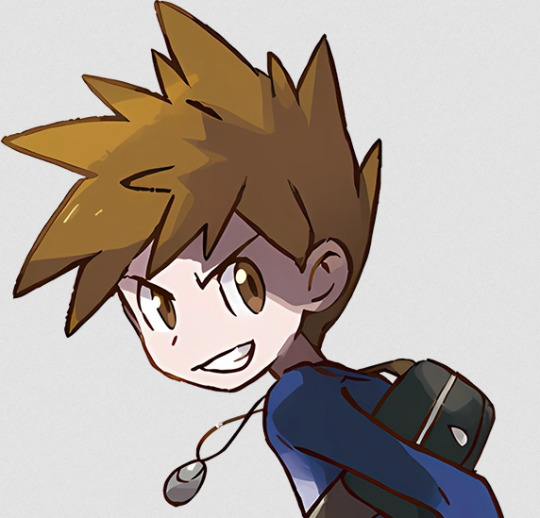

This is really long character analysis of these two and various media counterparts of theirs, so I'm gonna stick it under a cut.
In some ways they fit their roles quite well - aside from the obvious colour associations, you have Red as the hero whose sense of justice is stronger than his sense of self-preservation, and you have Green as the privileged rival who cares about beating Red above all else.
But, if you look at it another way - Green's got the light spiky hair, the hot-headed and boisterous personality, the drive to Get Better And Win. He's designed to read as really open and chipper, yet snarky. Sure, he isn't dumb, but he's arrogant, and he's got something of a one-track mind; the guy finds himself in the middle of a hostage situation because he's just that hellbent on fighting his rival, and does not seem to be thinking about anything else. He's also got a motivation - given how the Professor talks to him in the championship room and supplementary material like his Generations appearance, it's not a stretch to think the reason he's so driven to Get Better And Win is to prove himself to his grandfather. It's shown in later games and supplementary works that he's become somewhat of a mentor as he got older and wiser.
Red, on the other hand, is a quiet loner whose only motivation seems to be to get stronger for the sake of getting stronger. He's level-headed and dark haired, his cap rounding off his edges and obscuring his face. He's heroic, but not really sociable, as evidenced by the fact he spends the Johto games alone on a mountain without having told anyone where he went. He seems isolated in a way that later games' protagonists really don't. He may have always been a step behind Green, but he's always better.
Equally fascinating to me is how other adaptations have changed the base designs around and rewritten personalities to suit different purposes, while still being visually recognisable as counterparts to their game-selves.

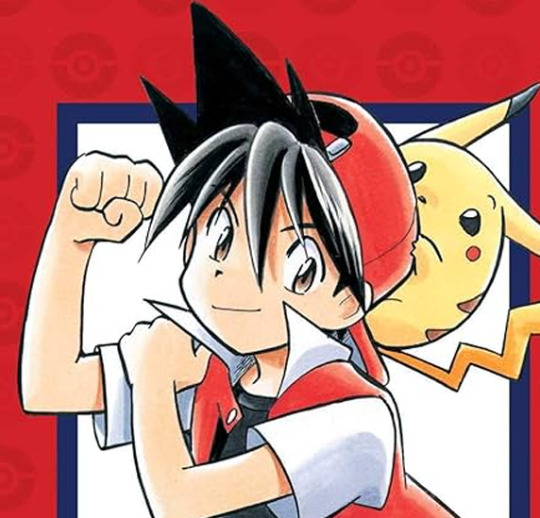
For example: Red and Green's counterparts in Special slot WAY more neatly into their stock shōnen roles, with Red as the boisterous hero and Green as the broody rival, and it's reflected in their new designs.
Red's hair becomes spiky to reflect his more excitable nature. His hat, in turn, never obscures his face; it's always either tilted back to accommodate his fringe or turned backwards. Green's hair, on the other hand, is not quite as spiked upwards and instead falls into his face, frequently obscuring his far eye in the same way game!Red's hat does.
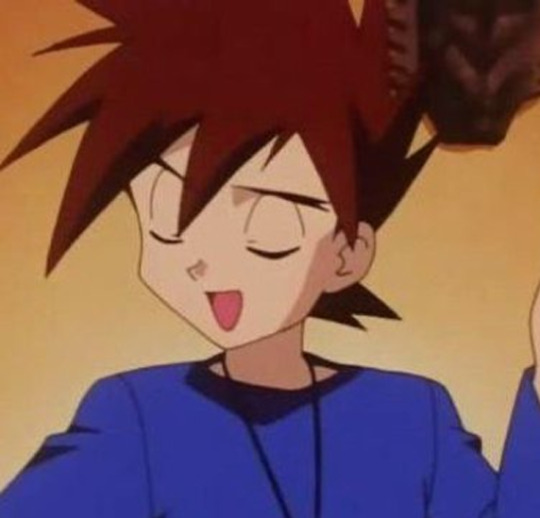
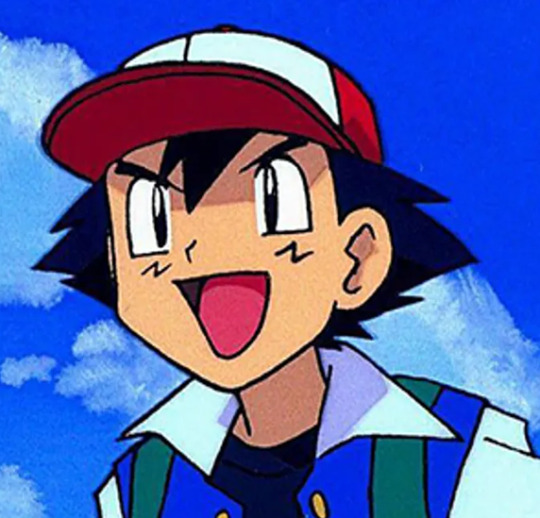
And then, of course, the anime balanced them in a totally different direction.
Instead of scrapping Green's personality wholecloth, it's become exaggerated in Gary. He's not the broody antihero rival, he's the arrogant, privileged, better-than-you rival. He's always ten steps ahead of Ash, always pisses him off, and is ALWAYS better until the end of his run. The anime also emphasises his intelligence far more, with him doing things like rattling off dex info and the speed of light in mph off the top of his head, to further contrast him with Ash.
Ash, who is of course THE shōnen protagonist. He's dumb, but determined, and always ready to help people in need. Unlike game!Red, the power of friendship (with more than just pokémon) is central to him; any given season of the show is defined as much if not moreso by his travelling companions and interpersonal relationships as it is by whatever he's actually doing.
It's funny to me, though, how most adaptations seem to find the fact that gameverse Red and Green have swapped some stock roles as something to fix. Even Origins, which is probably the closest a high-profile adaption has come to game-accurate, made its version of Red louder and more standard-hero-esque.
I'm not knocking any of these things, of course, just observing. I adore both Special and anipoke. I just think that the way the game characters are written could lead to some interesting dynamics were it to be explored more.
#pokemon#reguri#pokespe#pokeani#anipoke#trainer red#rival green#blue oak#dexholder red#dexholder green#ash ketchum#gary oak#character analysis#sorry not sorry for writing an essay on a whim. it will happen again#namelessshipping#originalshipping#palletshipping#kindanotreally#but i think yall will appreciate my char analysis of them as a dynamic yknow. i am one of youse#dent's meta
2K notes
·
View notes
Text
Falin who cares too much and too little - analysis
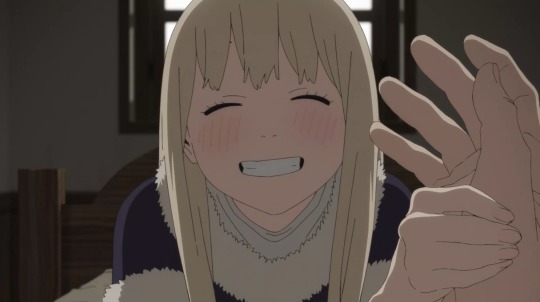
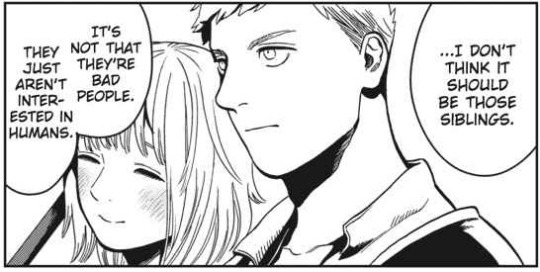
Been stewing on Falin thoughts for a while, I know I have an interpetation on her that differs from many but I’m jumping into the fray. I think there’s a lot to be said about what we do see of Falin. This shorter Falin analysis I made is heavily encouraged prior reading. This analysis mainly explores her complex relationship with caring and so it’s sort of structured in two halves, with Faligon at the crux of it all.
Falin cares too little :
A lot of people assign Falin a people pleasing mindset and I… Don’t agree. We never see her care at all about people in her town or at the academy not liking her.
We do see her worrying about what people think of her… ONCE. And Laios comforted her, told her they didn’t matter and she should be proud of herself. She latched onto that hard. That’s why this scene was so important to be included during the dragon fight, relationship-defining; it’s always been them against the world. She grew to not care what others thought, to only focus on her close loved ones. No one else matters.
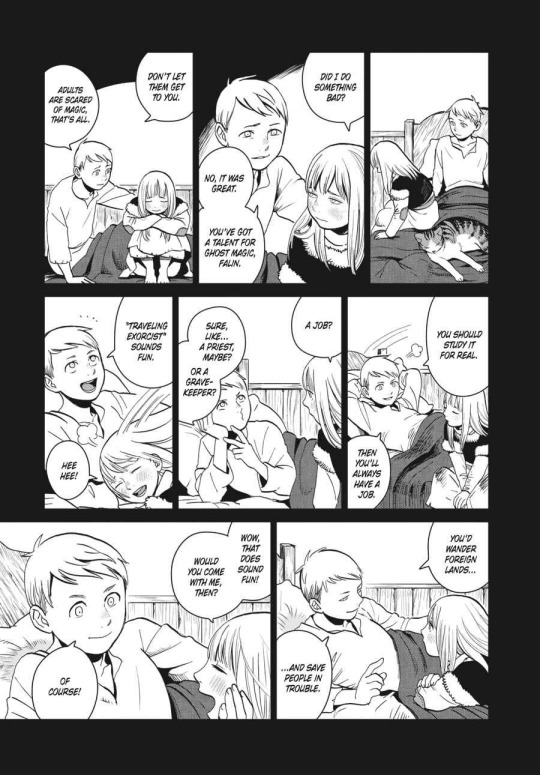
Laios’ words were her world. Her older brother who taught her how to feel comfortable with herself, who told her, you’re great, others are the ones in the wrong to not see that, I’ll always be with you, always be there for you. Older brother who always made great plans, who always knew more, who was better at wrestling to name the dogs, who she has always idolized. Laios who always spoke of traveling the world, to which she always said she wanted to follow. And she would, she’d follow him even if it meant leaving the academy and all she knew behind, she’d follow him to the ends of the world, and that’s what she did.
She didn’t care about showing to her classes or keeping up such appearances, she doesn’t even think of toning down her jumping into bushes when Marcille recoils, etc. She acts like an obedient pawn often, to her parent’s directives and then following Laios around no matter what he decides to do, but I don’t think the motivation is people pleasing, rather it’s being with & caring for her loved ones, and her go-with-the-flow attitude enhances the impression. Not that it’s as simple as that, mind you, but let’s talk about this for now.
Falin is perceived as selfless because we, the audience, have our perspectives revolving around the main people in her life (Laios, Marcille). They’re the ones she’s devoted to and people who care about her back a lot too, but to people like her classmates or the towspeople she probably must have seemed like someone who didn’t care about the people around her or her surroundings a lot, who just went on alone and did her own thing.
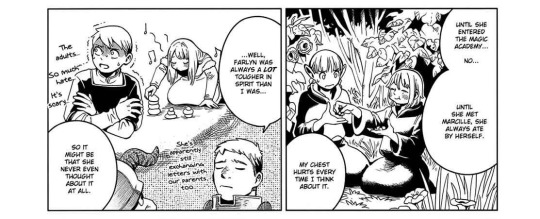
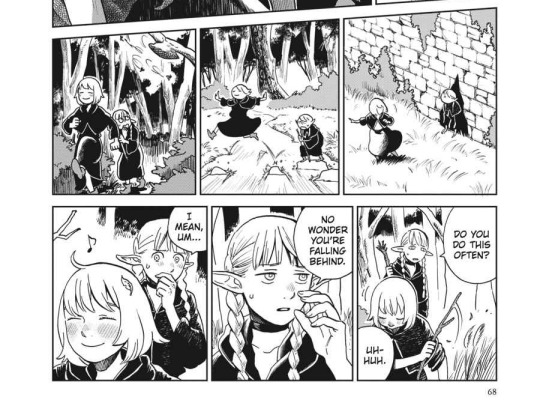
What matters to Falin? From what place does her kindness come from? Is a part of her keeping up appearances? And I think that’s the point, the horror of Faligon as well, that we can’t tell just how in control Falin the person is as the chimera (because we are shown that she’s in there, we just don’t know at what degree), that we don’t know her enough to be able to tell when she’s at her most genuine, her most raw. That even if you do settle on none of her being present as Faligon, we have to at least consider it, consider that she may be able to do something like this and have a part in it, brutal and uncaring. That even the lenses we see her through, the people who love her, may be unreliable.
And this is what’s very interesting about her too, she truly is so idealized by people around her as a saint. She’s so good and kind and caring to everyone etc etc etc. Laios, Toshiro and Marcille all see her as the paragon of goodness in the world. More cynical characters like Namari and Chilchuck have more layered opinions on her, the latter finding her somewhat unnerving because he can’t read her well. But then with that one flashback scene we see that… Her priorities are intensely focused on Laios and Marcille, she doesn’t care all that deeply about anyone other than them (+ maybe her parents). The rest of the party is in the same danger here but only Laios and Marcille who she’s speaking to get the special ,ention, and if they don’t cross her mind then of course she’d be ready to sacrifice strangers through a risky teleportation. That doesn’t make her not kind or caring!! Just that greater good isn’t exactly her priority. Any means is alright if the end result is her loved ones safe, it usually takes the form of healing and caring, but we see she’s ready to fight and make dangerous calls too. To me there’s this aspect to her that she isn’t as pure and magnanimous as everyone thinks she is, both in-world and interestingly enough meta wise as well, and there’s something interesting to that.
People pleasing implies a need to be liked, needs for the motivation to be that. A yes-man, etc. But if we analyze Falin, her general kind, smiling demeanor is more a matter of passivity I yhonk. Conflict avoidance is easier, so she’s friendly and hopefully things’ll be smooth sailing. It’s easy to be kind to classmates even if they act wary and rude if you don’t care about what they think either way. Of course she prefers good things happening to people over bad things, she is genuinely kind, but I think people tend to assign her a very grand altruistic way of life when to her the motivation is pretty self-centered. She doesn’t do what she does because she loves them, but because she loves them.
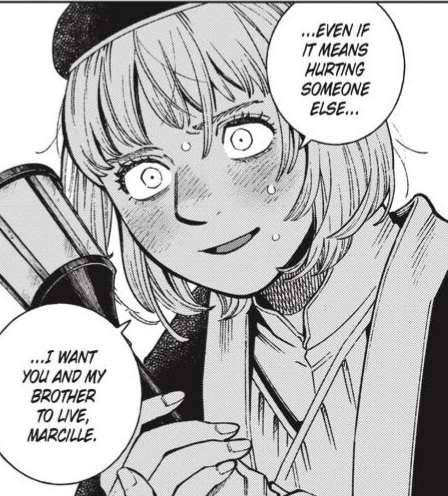
One situation that’s interesting to dig into for her way of thinking, and what I’m trying to get at, is Shuro’s proposal to her. I’ve seen people saying she hesitated because she didn’t feel comfortable saying no even though she wanted to, "I can’t say no, I don’t want to hurt him", something that sounds sensible and familiar, but it’s actually canon in the Adventurer’s Bible that the reverse was the case, that she didn’t feel comfortable saying yes. Because the offer was tempting, but it’d have been a loveless agreement on her end. And it makes sense she’d want to say yes too, like we see with the Toudens, marriage is very much a political strategical economical thing in their village, there’s even a bit on it on Laios’ Adventurer’s Bible profile about dowries, and both siblings were engaged very early. They lived poorly for a long time, it’s an enticing idea to marry rich, to have not only yours but your brother’s needs met forevermore easily, which at one point in their careers was their main worry and goal. Why shouldn’t she accept a life of leisure and wealth handed to her by a lovely friend?
So her hesitance was "yeah that’s convenient for me, but where it’s everything to him and heartfelt I’m able to be detached because I don’t care about it that much… Can I do that? I’m not reciprocating, not saying yes in the way that matters. Can I do that to him?" Very caring even though it’s not what you’d expect, isn’t it?
And central to my analysis, where I’m going with this is, I feel like that’s the thing with her character, that she doesn’t feel as strongly as she "should" sometimes, or feels a different way than she "should", or at least that she feels that way and others say she does. She didn’t mind suddenly leaving the academy, leaving Marcille behind and not seeing her for 4 years. She acted like it was no big deal that she sacrificed herself after getting resurrected after the red dragon fight. And in both those cases it upset the people around her greatly that she didn’t seem to get why it was such a big deal, didn’t seem to care about how they’d experienced her choices.
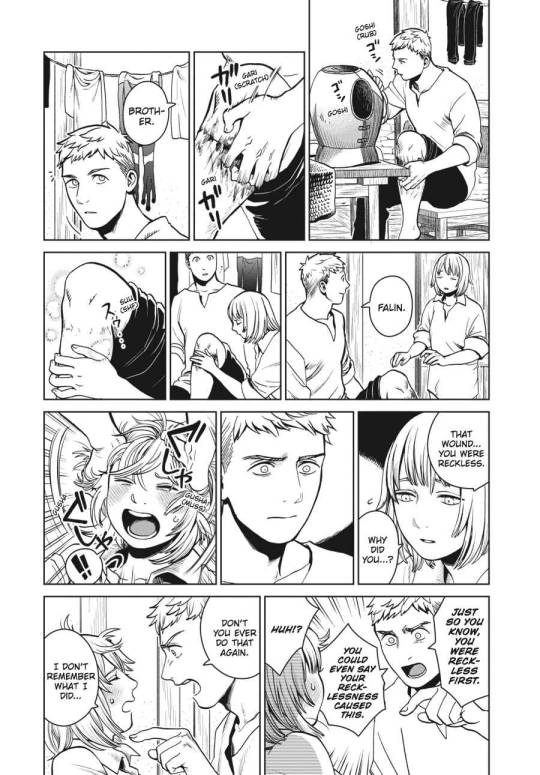
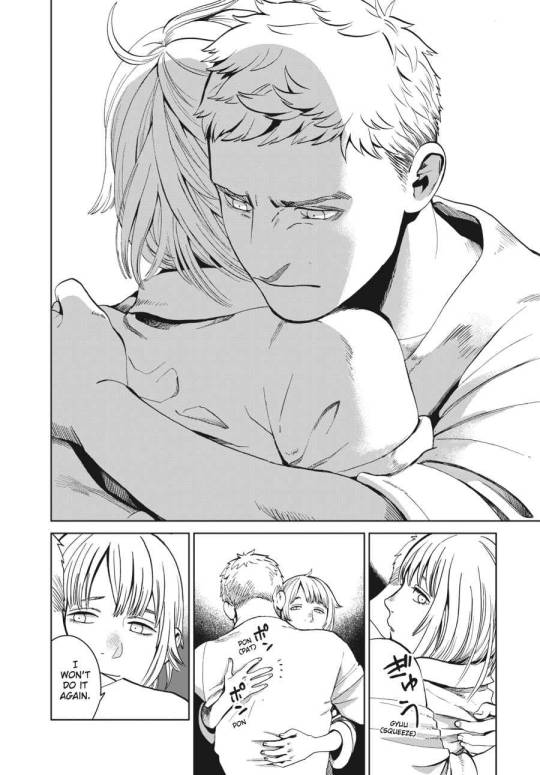
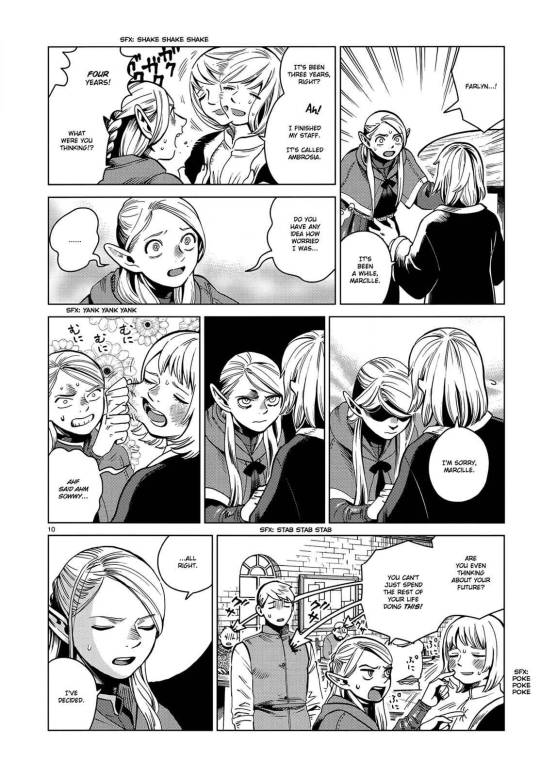
So it’s a tendency… And it’s not that she doesn’t care, it’s just that the way she measures what’s good for the ones she loves isn’t the same as what they themselves think it is (like Laios and Marcille not wanting to be apart from her). It’s an overt but quiet kind of care, it’s doing things like following them around and making sure they bathe and have a meal, even if that means she has to be dragged into misery too.
So yes she probably would know "not caring enough/the right way" is one of her perceived flaws, and that informs how she tries to handle her response to Shuro’s proposal. Her not wanting to accept like her first gut instinct, is because she’s thinking about reciprocity, about if it’d be right to go into this knowing that they have different priorities and she might not be able to keep up with the type and amount of emotions he wants/expects from her. And that’s a big part of her character isn’t it, having expectations pushed onto her. Her trying her best, but in her own way that may seem odd or even unfeeling. Not unlike when she exorcised the ghost as a kid too, unblinking and matter-of-factly, and not seeming to understand why people stared the way they did.
Even though she answered his proposal only post-canon, she’d been pondering it for a while even pre-canon and the Adventurer’s Bible explanation was released midstory, so I’m hesitant to assign her much growth about her hesitation and what I went on above, since she still didn’t react "right" with Laios after the red dragon fight (even if she apparently doesn’t remember sacrificing herself) and put herself in that situation in the first place. She hasn’t finished her arc on that flaw of hers is what I’m saying, she for sure still has it, but I certainly think her thoughts on Shuro’s proposal shows awareness, both of herself and social.
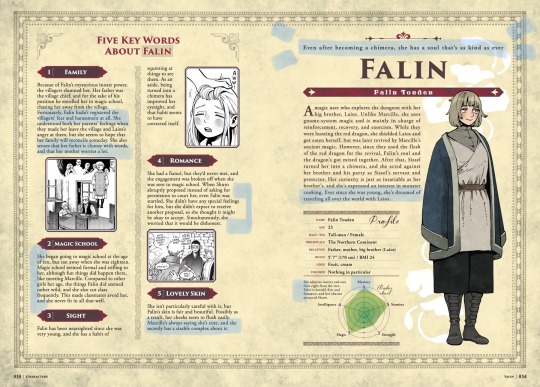
And awareness is a big analysis key word with Falin, especially here it can be hard not to conflate not caring with not knowing. How socially aware is she? It’s rather layered, because canonically she wasn’t aware of her ostracization in her hometown at all, and we’re not sure if she knew Shuro was interested in her before he proposed, but she generally seems more socially aware than Laios. She tags along on his caravan job to make sure he isn’t being mistreated (though doesn’t ask he get a salary), she catches social faux-pas more easily like in the genderbend magic mirror omake with Shuro, and interestingly enough she’s very good at empathizing with her parents and understanding their perspective. We see when she’s worried about Marcille coming that she does know about propriety and how appearances shape impressions. Being a chief’s daughter must at least have taught her a thing or two on that front.
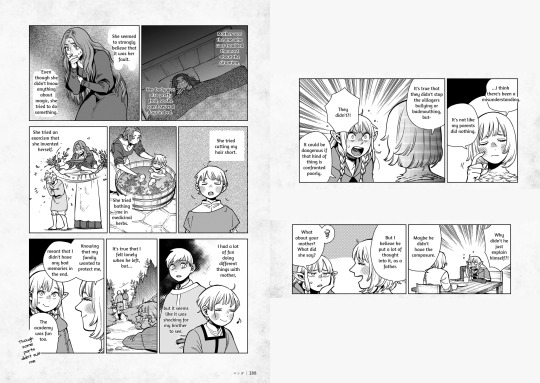
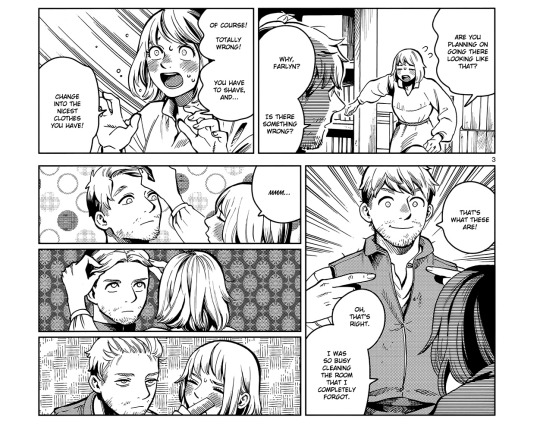
She never stands up for herself, but when it comes to defending others she worries, strategizes and explains.
And this sort of understanding is part of why I think she’d notice the expectations pushed onto her like I was saying earlier, notice how she makes people feel when she’s careless. But if she changes anything about herself in response to noticing is for her to choose, and generally I think it’s a sort of inbetween of yes and no: that she becomes more complacent but also more reserved, complying but by hiding more of herself passively. She’s not sure wether to accept or reject Shuro’s proposal, doesn’t want to lead him on? She’ll just be taking a while to silently consider it, try to keep things as they are for the time being. The third, less conflicting option. She doesn’t feel heard by Marcille who keeps infantilizing her? Just bear with it. Retract yourself emotionally. Settle for it.
We see that when she was young she had a tendency to not read a room, and I think that’s here too. She doesn’t get why her nonchalance upset others but that doesn’t change that she doesn’t want them upset or hurt, so she tries, albeit in maybe a roundabout way. She always had a hard time deeply connecting with people, often keeping herself some amount of emotionally distant: erasing herself from the equation, from the two-way trade that relationships are and making it a onesided thing instead, where all their needs and emotions are directed towards her but she only lets out a bit of her own show. She takes everything upon her and deals with it and tries not to give others this same burden, though not on a conscious level, it’s just that she’s learned growing up that she doesn’t have much agency.
Like I went into with my analysis linked at the beginning, I think Falin is used to just taking what she can get and not asking for more, when it comes to social bonds. She’ll take spending time with her mother no matter what it is they do, she’ll follow Laios to the graveyards and stick by him even when he’s pushing her away (because he doesn’t want her borrowing his book or "No copying!" or such). Her father was always distant, cold and uncommunicative, her mother was considered sick from anxiety and the exorcism attempts were the main way they spent time together, at dinner tables there were only her and Laios. The dogs picked on her too even if she loved them— And so did the townspeople, maybe that being normal to her at home is why she didn’t notice the ostracization she suffered.
She’s always been the last to be asked about decisions or what she wants, never asked to play with at recess, neither her father or Laios asked before sending her to the academy or leaving the village. At home, in the hierarchy she was considered to be below the dogs by the dogs themselves, as someone they can disrespect. Dogs learn from example and behavior, so this means Falin must have been pushed around a lot, and that the family didn’t try hard to rectify the dogs’ misconception, likely worsened by Laios regularly wrestling with her as a competition.
So for example when Falin showed Marcille food, it was her way to implicitly ask to have lunch with her without voicing that question, without daring to take up space. Someone’s presence isn’t something you ask for, it’s something that’s bestowed upon you, you can follow them around but you can’t ask them to stay or to come with.
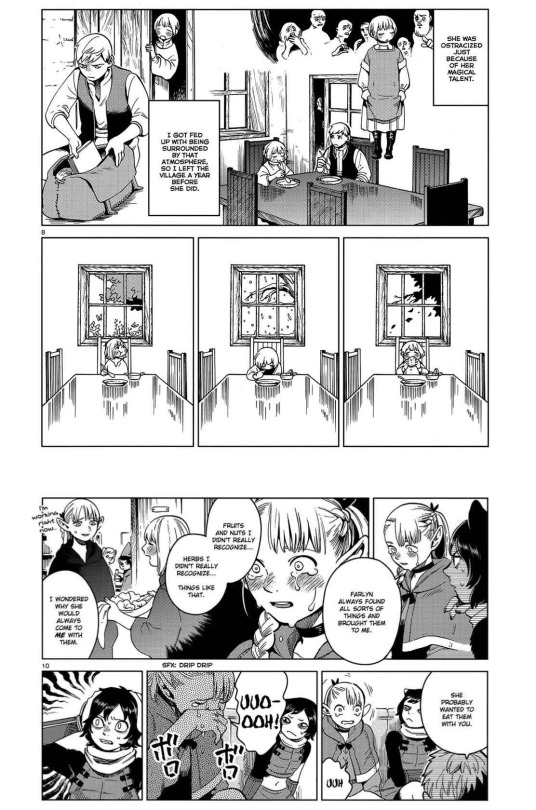
She’s used to her needs and wants not being listened to, so she’s learned to have less wants. Caring less about herself, caring less about other people beyond her safe zone, was a defense mechanism in part. She has a sense of learned helplessness too, like how when Marcille came to take her away from Laios, even though she didn’t want to leave with Marcille it felt so determined and unshakable to her that whatever Marcille decided Falin would have to comply with.
And still, it’s the "marrying you would be awfully convenient if it wasn’t that I’d feel guilty for not loving you back, the way you wanted me to when you proposed to me" and the "I don’t regret leaving the academy and leaving you behind without goodbyes but I’m sorry that you’re so much more upset about it than me". It’s the guilt of not loving people back the way they want to be, with the same intensity or fervor.
It’s the autism it’s the aroace of it all, it’s the emotional stunting and confusion but the pit in your stomach telling you you did something wrong again. The no object permanence even for people you love even for 4 years, it’s the feeling like you’re somehow at fault for someone having fallen for you and not knowing what to do with any of it. I’m not joking btw it isn’t uncommon for autistic people to not see their close friends for a long while, not having missed them all that much and for that to be really hurtful for the other if they notice/ask about it. "Hiii bestie! Oh umm you’re uh more emotional about this than I expected, hopefully you won’t feel alienated by me not feeling as intensely about it…"
So… Yeah. I think she thinks of things and relationships in a different way than most people, and beyond "good things happening to people is good" I don’t think she actually cares about people all that much. I’d argue that Laios shows more desire to connect with others and make relationships. And just like with Laios and his own issues with humans, that doesn’t mean her kindness is a lie or ungenuine or worthless! It just means that like, well it’s pretty straightforward really, she’s not all that social and doesn’t see casual bonds as meaning all that much and whatnot. She does want to see people happy, but it’s not as much like… A conviction or goal. She’s too laser focused on a select few people. "It’s not that they’re bad people, they just aren’t interested in humans."
And sometimes it feels like people get defensive about Falin in a meta way too, like if you ever so much as imply Marcille isn’t her whole world or that she isn’t the kindest soul out there then you’re saying she doesn’t care at all or she’s evil. And that’s actualy exactly the sort of vibe I wanted to get through with my analysis above here actually haha, that she does care and she is kind but it’s not in a way that’s quantified or understood in a way that makes people feel comfortable. In a way, that makes people feel insecure because they don’t have the same logic as her, don’t show love the same. And I think this is another stellar depiction of autism, of parts of it that feels unpalatable to many, if I’m making sense. The fandom idealizes her as well, which isn’t uncommon or surprising for the character embodying the trope of the perfect beloved to rescue.
And disclaimer, as I said in the tags I feel like the details of Falin are pretty vibe based when it comes to analysis, there’s absolutely a valid angle where she does super care about everyone always, feel free to disagree with me on the overarching angle of my analysis. There’s enough supporting evidence to tip the balance either way I think, and the reason I’ve chosen this angle is I feel it’s more compelling for the themes in Dunmeshi of idealization and being different, of desires vs wants, and because I think it neatly ties up Falin’s character arc as I’ll go over throughout the next section…
So.
Not feeling as much as she should. And……. Is this not Faligon pushed to the max?
You can’t tie down a dragon. As the chimera, she gets to just not care about everyone else and be on her merry way.
Part of it I think is finding comfort and freedom in the mindlessness, in not having the burden of feelings and connections and a consciousness (despite still ending up seeking those in a stranger, Thistle). Like when she’s dead in the purgatory as well, she gets to just… Hang around and do whatever. Similarly to when she played in the forest instead of going to class in her academy days. That’s what freedom and peace of mind looks like to her. Why she decides to roam post-canon, if only now with the goal to find herself instead, with her mind in tow and somewhere to go back home to.
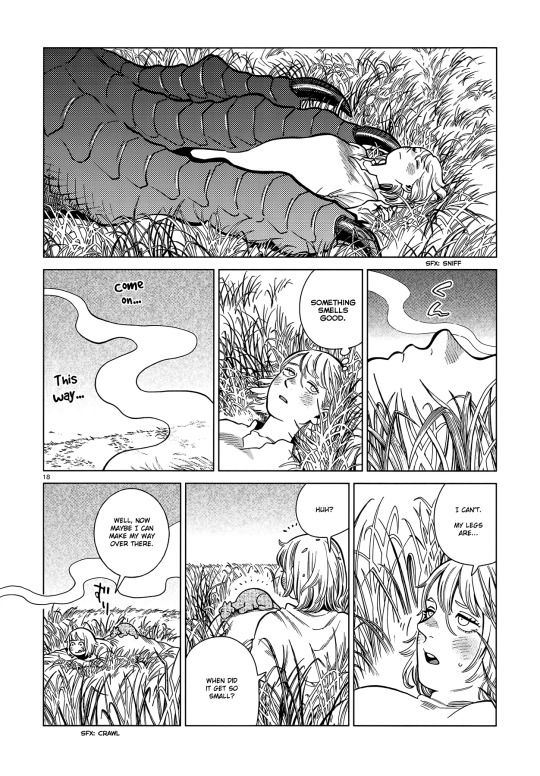
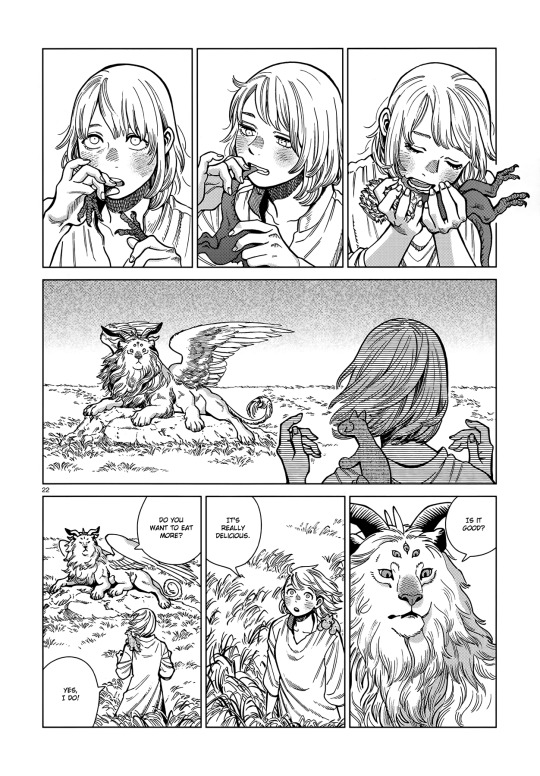
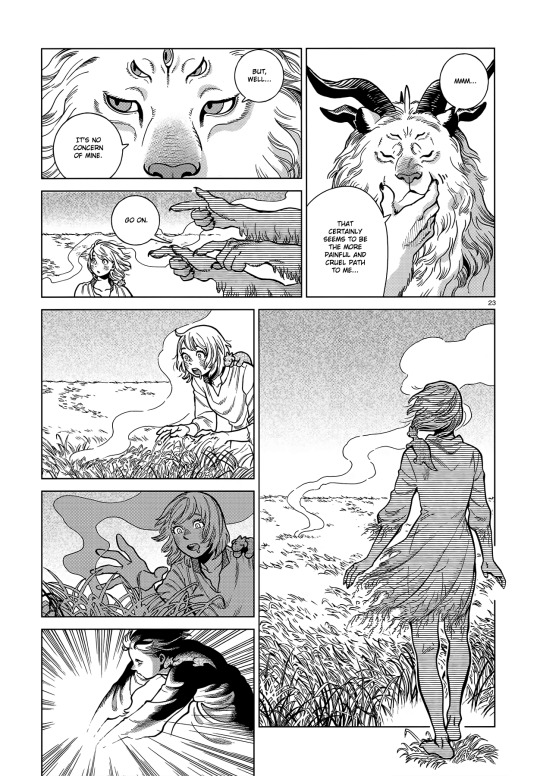
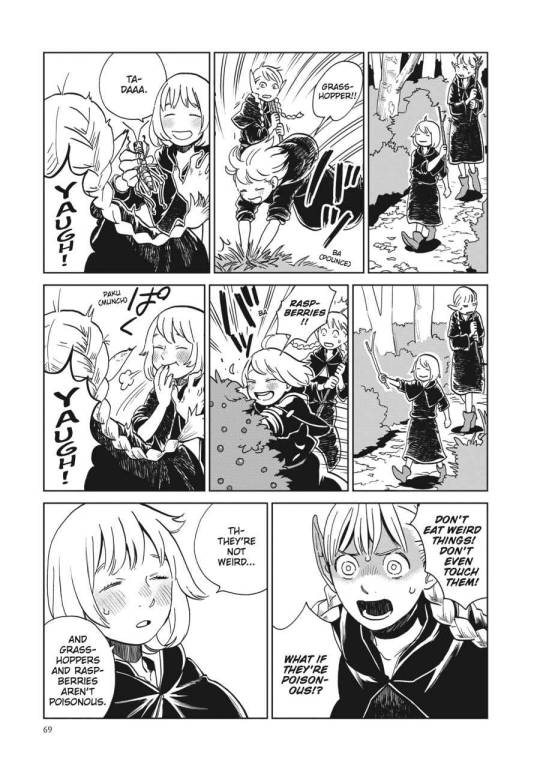
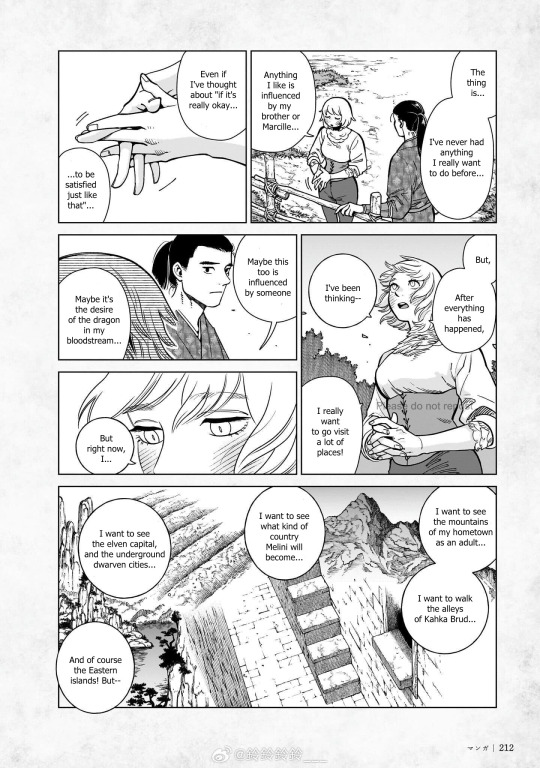
There’s excellent analytic framing out there about how of course, Dungeon Meshi has a big theme of grief and letting go, and… Falin was always a symbol narratively, idealized by characters and often underconsidered by them despite their love. It was Falin’s choice to sacrifice herself for Laios, she thought it was worth it, knowing that it would be her end. Her resurrection and the process of it intertwining her soul with a dragon’s wasn’t done with her consent, and the subsequent opening it gave her to become a chimera puppet. She’s stripped of her agency consistently, and so… It’s very noteworthy that the final choice, of wether to go back to life or to stay dead, in that purgatory scene, was up to her. And she chooses life, but I do think about her in those fields and how at home she seemed there. Peaceful, by herself in a vast calm expanse she could explore, free.
Personally, I think freedom is Falin’s own subconscious selfish desire. And though to us becoming the chimera is obviously a shackle, I think it felt like freedom to her somewhat, too.
And if you think I’m going wildly off the rails here I want to talk about Laios’ wish of becoming a monster. And to be clear before getting into it, being mentally a monster is absolutely a big part of the appeal for Laios, it’s something that’s consistently referred to, something especially pointed out in the werewolf monster tidbit with Lycion. Right panel is from that, but left panel is from the extra with Izutsumi where Lycion talks about suppressing souls in a beastkin body, the human or the beast soul.
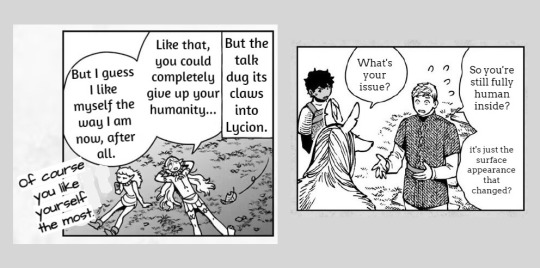
Finding comfort and freedom in being mindless, less sentient, less aware? While being unaware in her hometown might have saved Falin a lot of heartache although perhaps stunted her emotional growth, it’s always been Laios’ curse.
Actively, through his choices, he seeks to grow closer to people, to form deeper bonds, to understand and be undertood, but… On a deep seated level, what he desires is to leave humanity and civilization behind. He has an irrational hatred for humans, born from the trauma of ostracization, being different, being beaten up and rejected consistently through his life. Running away from problems is easier. He wants to be free from being a social animal from a social species who has deemed him the black sheep, he thinks it’d be simpler to just leave it all behind, people and his own humanity. At its core, to Laios becoming a monster is a power fantasy, a coping daydream of "if only I could be strong enough to never be hurt again, the power to destroy anything I want, the power to go somewhere better, if only it was possible for me to never feel hurt again. If only I could be someone, something, that can never be hurt". "If there’s someone you don’t like, you can gobble ‘em up in one bite. If you could fly, you’d be able to leave this village right now." It’s a childhood fantasy, from a deep sense of being misplaced and a desire to be able to stand fearless, thinly covering up resentment that Laios represses.
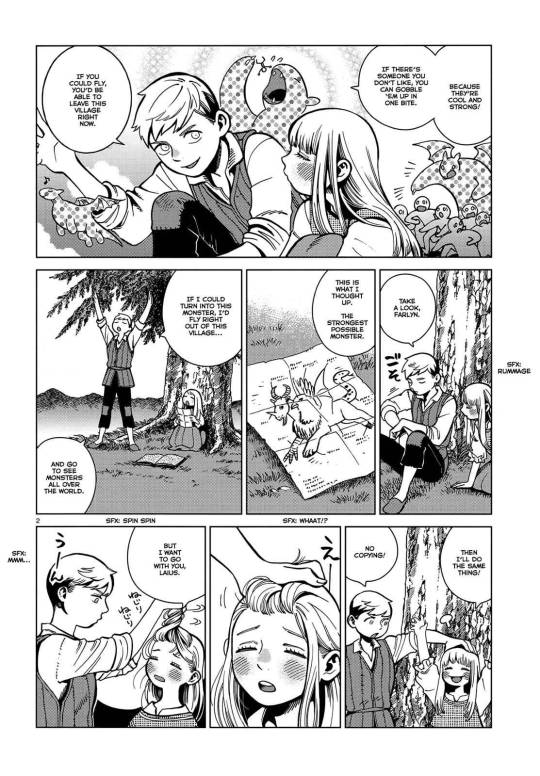
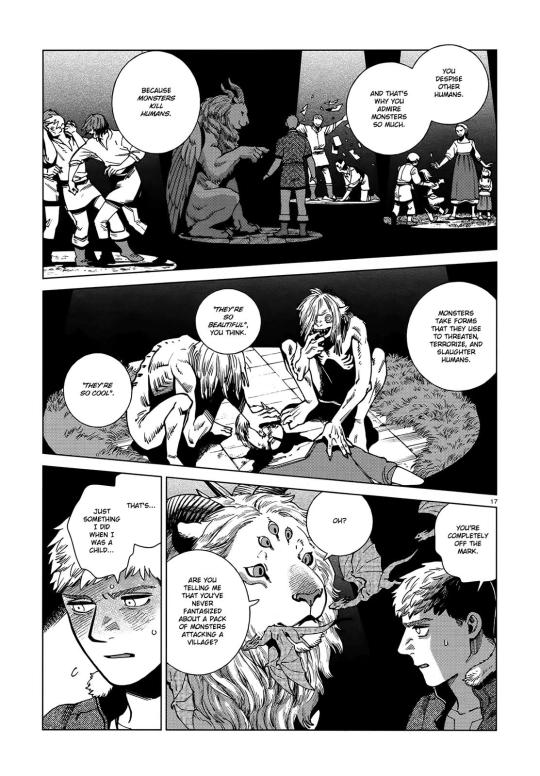
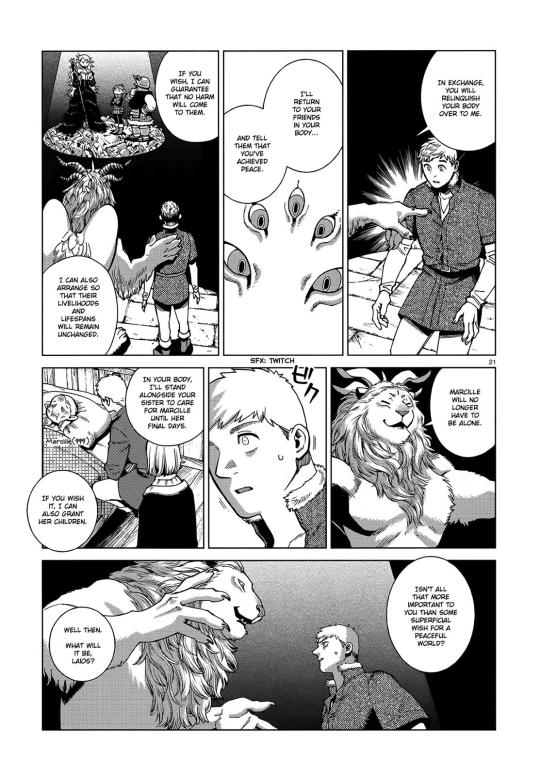
But you’ll notice, when the Winged Lion is enticing him in the last page, even now with his lifelong wish of becoming a monster on a silver plate, he still cares about his friends. He still has that sense of responsibility to his friends, doesn’t want to leave knowing they’ll be in danger and alone. The offer that his friends may be left unharmed is already good, but Laios also visibly flinches when the Winged Lion offers to specifically care after Marcille and rid her of her biggest fear. Laios’ care runs that deep. Not unlike with the succubus, he resists temptation until he gets reassured that everyone will be okay. But see, what he desires isn’t to stand alongside Marcille until her last days, it isn’t to stay and see how well his friends will live, it’s to go. It’s to leave. It’s to fly away, a monster both in body and mind. He wants to be free from caring here, wants to not have to worry about his friends, wants to just go do his own thing, but for that he needs to feel safe in the belief that said friends will be safe even without him being there to see it, because despite everything else he cares, he does. It’s again that dichotomy about caring and wishing you didn’t, or not caring and wishing you did.
In the end, it’s Falin who achieves that wish. Both by becoming a chimera during canon, and by going traveling post-canon. In the latter, being both free of human relationships as something chaining you while still being uplifted by them, by the knowledge that there are people out there you love and that love you. It’s a theme that can also be connected with Marcille, because she gets anxious over people she loves getting out of her sight, worrying they’ll get themselves killed, that time is passing while they’re away from her. But before she can get to the point where she can both have her freedom and being uplifted by her social bonds, regaining both her individuality and her connections, she has to get a taste of just one at a time. Before they can find balance in her life, she has to see what it’s like to have what she’s never had on its own. Unapologetic freedom, and power.
No one can blame you for not caring enough or caring right if you’re a fricking dragon!!!! You make the rules when you’re a beast and you can just… Fly away. From anywhere, from anything. And if a dog bites you you can just crush it. Instead of being pushed around by the dogs because you’re at the bottom of the hierarchy, you’re now at the top, the one with the power to be heard and do what you want without consequences.
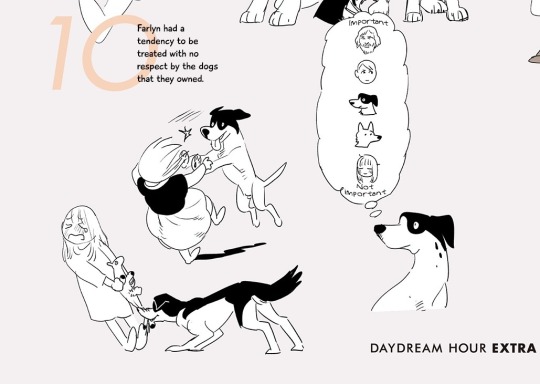
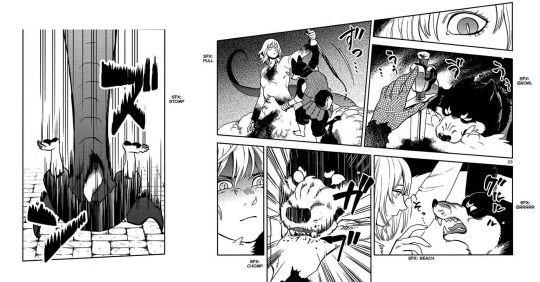
I think she’s on autopilot. I think she’s on autopilot a lot of the time, even before being a chimera, and it’s partly why her will is so weak compared to regular dragons. (Again, read my shorter analysis.) It’s familiar to slip back into the role of following someone around unquestioningly. And that’s what is weaponized when she’s a chimera, that instinct she’s been nursing all her life to unconditionally support, defend and follow someone. Only now, that someone doesn’t matter in itself, only the symbol of it. She doesn’t mind, either way is fine. Her will is weak after all, because she’s trained it to take as little place as it could.
Falin cares too much
She spends all her time caring for Laios and Marcille alternating that none of her care and emotional energy is left for others, including herself. So she had to get relieved of all of that for a bit, becoming the chimera so she could reset and recenter and remember that she, too, indeed, is there and an important part of her own life.
So you’re probably seeing the duality I’m talking about here, Falin is very self-sacrificial but for specific people in ways that they often don’t recognize or appreciate. She cares but selectively, both in people, putting all her eggs in the same baskets, and in the ways she cares after them. She doesn’t care a lot, but when she does she cares a lot. Falin doesn't have a lot of earthly attachments, but when she does, they're her world.
In canon her arc, especially post-canon, is to grow beyond Marcille and Laios. Her caring for her close loved ones held her back from looking after her own self-fulfillment needs. And this is what I mean when I say she cares too much; she could gain from caring more about the world besides Laios and Marcille, both lands wise and people wise. She cares too little, but her arc centers her flaw around caring too much instead. Her pitfalls that Kui highlight over the course of the story, while of course her selflessness is appreciated for how she saved Laios and everyone, on a personal level is shown to be self-effacing and damaging. She’s undermined by Marcille, without the courage to voice her thoughts and wants, she would dedicate her whole life to Laios. And I mean, it’s text, in the response to Shuro’s proposal extra no less. And she’s so laser focused on her most loved people that she’s fine with being callous and risking others’ lives, even.
Post-canon, she needs to leave to find herself, away from them.
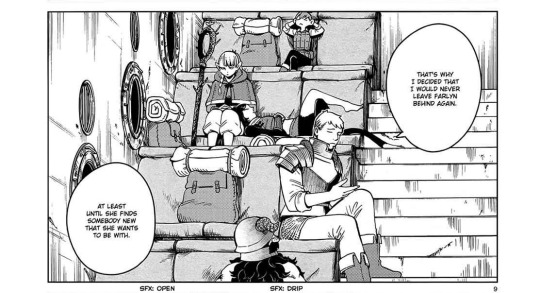
Herself. What if she wants to just be with herself for a while.
And this is me reaching but I feel like, not unlike Izutsumi who learns to feel this sense of never being alone, always having someone on your side what with having two souls, the dragon in her would make her consider herself more. She finds it easier to care after other people after all, and in the purgatory fields sequence she takes care to bring the bit of dragon left with her… Not unlike with Izutsumi, having two souls forces you to think about your identity and figure yourself out. Besides being this sort of duo now, where if she wants to care after herself she can channel it to that other side of her too… In meta dragons are symbols of greed, and I think the bit of dragon would push her to want more and listen more to her desires, primal and self-serving as they might be. The dragon soul which warped her human body with feathers and draconic features, her image of perfection marred, her weirdness externalized in a way that’s not palatable. But she doesn’t care, about if her appearance is palatable for most people, she hasn’t for a while now, and that’s great.
Notes & nuance
I’m struggling with the structure of this post, making my points organized, concise and strong at once. It’s difficult to make any statement without going "things are generally like this, but there’s this time that this contradicting thing happened too" or "it’s ambiguous enough that you should just follow my interpretation for the time of this analysis" haha, so this is the pit where I put all the stuff that wouldn’t fit well in other places but are interesting for Falin’s character. This section is pretty separate from the main thesis of the post, it’s just more Falin observations. The post has reached the 30 pics limit so I can’t just pull it up whenever it’s relevant but I really encourage scrolling up to read the stuff I highlighted in her Adventurer’s Bible profile if you haven’t already.
I think with the shy-looking loner type autistic kid archetype, and knowing she didn’t seem to mind others ostracizing her, it’s easy to lose sight of how she was by no means an unemotional child. In all the bits we see of her as a kid she’s bursting with energy and emotions. Canon confirms Laios leaving the village did affect her and make her lonely and she cried a lot, too. She may not be social in the traditional sense, but she was clingy with her brother, and she also never was all that shy about who she was, wearing her heart on her sleeve.And okay. Okay okay okay. Speaking of appearances. About what I said of her not caring about what people think of her, even seeming defiant with the caravan leader… There’s one istanxe of her caring actually, and it’s about how her face blushes easily. I remembered it as being because Laios’ said it and as I rambled Laios’ words are her world, but actually it’s ambiguous. It’s only Marcille imagining up this scenario where Laios says Falin looks weird because of it, there’s no evidence Laios said or thought that at any point. And on the other hand…
Her Adventurer’s Bible says: "5, Lovely Skin. She isn't particularly careful with it, but Falin's skin is fair and beautiful. Possibly as a result, her cheeks seem to flush easily. Marcille's always saying she's cute, and she secretly has a sizable complex about it." The phrasing makes me think the complex she has over her blushing might have developed because of Marcille more than Laios. "Marcille's always saying she's cute, and she secretly has a sizable complex about it." It could be related to how Marcille gets swept away and infantilizes her, calling her cute wanting her to wear cute feminine outfits etc. Again this feels like it relates to Falin’s struggle to be seen for who she is and what she wants to be seen as, her struggle to be recognized, having ideals and perspectives pushed onto her. Here Falin is insecure over her blushing implicitly because she doesn’t like being called cute over it, but that’s not how she wants people to see her. She doesn’t want Marcille to always see her as her 10 years old adorable friend. Like if your friend said you had puppy energy, it can be flattering, but it can also make you insecure.
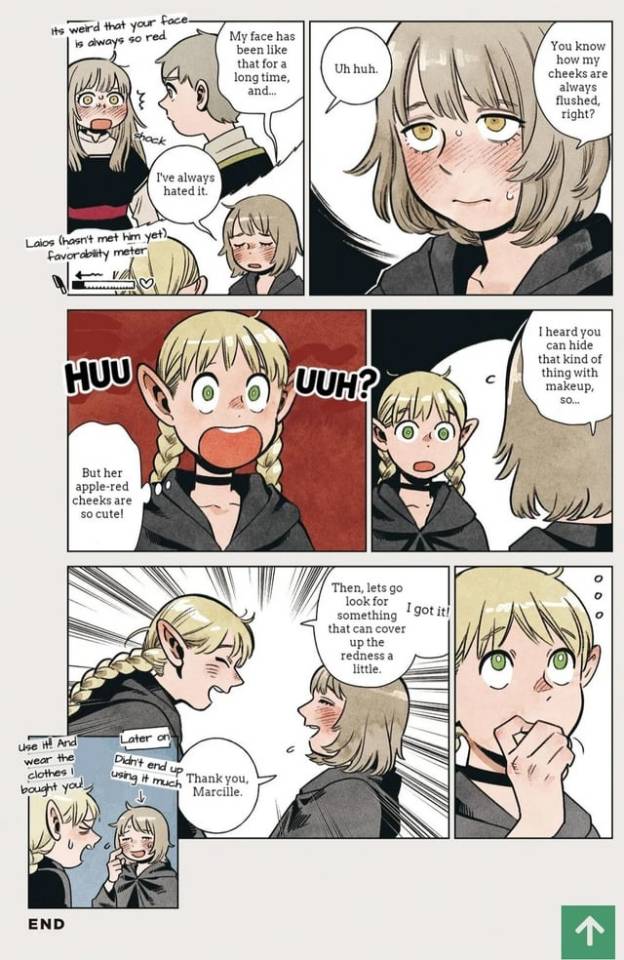
Here’s a link to what I mentioned about her being uncomfortable wearing feminine outfits. It does seem to be more about comfort than the aesthetic perse, to me. Interestingly the shirt & shorts don’t seem like they show much more skin than her beach outfit, so maybe it’s more about the shirt and shorts being tight-fitting. Like the skirts and heels they feel stifling. Again a bit with themes of freedom and not wanting an aesthetic pushed onto her. So yes just to reiterate, I think this is more about self-affirmation and how her identity and self-image gets shown to others, rather than wishing to hide parts of her body like her blushing etc for people pleasing reasons. Makeup was a way for her to appear how she wants to and feel more confident. It was a way to take control over her own image. She didn’t keep doing it, the narrator stating the process to be ‘troublesome’. Ultimately she still prioritizes her comfort, and it was a lot of recurring efforts to go through.
And on the topic of appearances… A friend once asked me: "Does she really hide herself or not? I keep thinking about "falin is herself first and foremost" (in her Adventurer’s Bible profile) it’s just so. Hmmmmmmmm... I just keep seeing people say she hides her real self from people when I feel like the issue is more about her charitable traits straying too far into becoming flaws but people around her dont realize that..."
Imo the thing is, I don’t think she hides her identity, but I do think she suppresses her individuality for others’ sakes if that makes sense. In the way that only post-canon does she allows herself to go see what the world is like, but that’s not personality wise it’s needs and wants wise. And I do feel like that’s the closest interpretation of canon, she says it herself she doesn’t know what she wants because everything she’s done was always about Laios or Marcille, but she doesn’t change her demeanor or personality for others. But she *will*, like, not ask for things she wants directly, like sharing lunches with Marcille at the academy, she suppresses her wants, doesn’t ask things from people and doesn’t hope for more, hope for better. I don’t think we ever see her actively repress her personality, except like what, being more laidback than enthusiastic but I do feel like unlike Laios with her it’s less ‘appearing stoic to fit in more’ and more ‘yeah i’ll just chill until I’m needed or something activates my enthusiasm’. To which said friend quoted: "to feel like you belong you need to be useful. when you can’t be useful the next best thing is being convenient."
And speaking of passivity… I want to speculate about Shuro’s proposal some more. Shuro and her got along well though we don’t know how much, or how often they hung out, she even saved him from a nightmare. Why did she take so long answering Shuro’s proposal? Was it an effort to preserve or was she really just that conflicted? Procrastination probably yes, but what is the core motivation of itl Considering she ended up saying no to travel the world instead, I don’t think it was as simple as ‘she wanted to say yes for convenience’. Logically it’s what would have been best, but it’s not what she wanted for herself, but it was and still is hard for her to even know what she wants. Probably, since like she states it was a great offer and she doesn’t think she’ll get proposed to again, it’s that self-effacing tendency that yes it’d be convenient and logical, and that makes her want to say yes even if her spirit isn’t in it, because if it’s convenient then that’s more important than her feelings on the matter. Man also… Obviously Marcille is very vocal about how she shouldn’t get with Shuro, but imagine how Falin’s whole perspective on marriage must have felt when her only friend ever is a Romantic with a capital R who gushes about idealized romances and grand gestures and True Love and doing things with fully pure feelings all the time.
AND speaking of passivity!!! How much Falin is "there" as the chimera, just how much she’s master of her actions, is left ambiguous and intentionally so imo, but she’s for sure there & influencing the dragon’s action to some degree. Having a dragon’s foot on her in purgatory that keeps her from moving for sure visualizes how it must have been like, but there’s Falin calling out to her brother Laios, there’s the kind attentions towards Thistle that are so Falin-like, and most explicitly there’s the Adventurer’s Bible stating "Even after becoming a chimera, she has a soul that's as kind as ever", which I honestly dislike, a fantranslation puts it as "Even as the chimera, her caring nature remains" and either way to me it feels like confirmation that it’s her giving those berries to Thistle. Now, wether or not she has the mental capacity of a chicken or something closer to human Falin, no clue, there has to at least be some kind of mind bond between monsters and the dungeon lord, compelling or forcing them to go along with orders, or calling her to him in distress like with the fight on the first floor. But yes, it’s interesting to wonder what it is that a Falin, with her kind soul but without her human mind, would willingly do. On her profile, she’s described as Thistle’s guardian and servant. The power dynamic between the two are very interesting, I already went into how it might have felt like freedom to her while being fake so I’ll reign myself in and just mention it again. She’s still at the heel of someone, only now it’s someone who doesn’t care about her back. Going from being cared for so strongly that it’s suffocating and they would defy death and the world for you, to being devoted to someone who has not one feeling about you besides your utility as a paw . She has all this care to give and to focus onto others and he has none to send back to her and I think that’s part of it. In a way, being left with only her own feelings and a void, without expectations or feelings or ideals pushed onto her, it might have been soothing in itself, and eye opening. But yes the way I think of it, her care for Thistle isn’t unlike the care she gives the ghosts.
Interestingly, the care she extends for the ghosts is sending their soul to a peaceful death, freeing them, of life and any earthly attachment. Take that as you will with the themes of freedom and burden of life and mind, immortality and becoming a warped version of who you were, and such and such.
But going back on the topic of connections and bonds for a bit, I think academy days Falin & Marcille is super interesting bc we’ve never really see Falin form a connection besides with Marcille and even that is kept pretty ambiguous. When was the point that Falin started seeing Marcille as a friend and seeking her out? When was the "I’ll lay down my life for you" point? I’m so fascinated by how she wanted to share lunches with Marcille but never truly asked, only made little "hey want this? I found it isn’t it cool?" gestures of showing things to her… It’s the only way she knows to ask, or maybe it’s the only way she feels comfortable to. In all the scenes of young Falin and Marcille Falin seems comfortable in her friendship with Marcille, but at the same time… I think we see Falin at her most insecure around Marcille, because she really does care about Marcille and what she thinks of her so much, and while Marcille is a bit of an unstoppable force tornado style (affectionate) Falin is something of a doormat. I’d usually say showing her berries was her earnest way to connect and be like "Hey bestie look at this! :]" , but there’s a real possibility that she was self-conscious and holding herself back.
Friendship and Marcille! Involving Laios into this too but, again with the autism thing of not showing you care in ways that others understand, Marcille being very overtly affectionate and clingy was so so soo important… Marcille keeping on hanging out with Falin and caring after her, and being undeterred/unbothered by Falin not always seeming like she cares all that much back in the conventional way, as in Falin acts nonchalant and a bit like she didn’t mind wether she was there with her or not during her outings to the cave dungeon. Caring and being clingy and so affectionate despite that in such a classic Marcille way is soo needed, because so often people will get discouraged by say, their friend not keeping in contact regularly/well, seeming disaffected or as happy-go-lucky as ever even if you haven’t seen each other in a while or when they’re alone, and yes there’s potential for a strong friendship there but someone like Falin won’t be committed enough to reciprocating attention the same way… I hope I’m making sense but yes this angle in particular strongly correlates to autism. And the way Marcille always initiates physical affection, both Toudens being awkward about initiating touch because they don’t know if that’s allowed, if they’re going about the social interaction the right way, if they’re allowed to ask that out of someone…
Another fun observation to make is about the 4 years Falin and Marcille spent apart. Marcille despite being of a long-lived race treated these 4 years of separation with more gravity than Falin did. Falin brushed it off very dismissively to say the least. But then you remember that the amount of time Falin and Laios didn’t see each other after he left the village was 8 years. Double the years, double the time. And that reminder makes Falin’s actions so starkingly understandable. Of course she wouldn’t see 4 years of separation as a long time if 8 years of separation with her beloved brother is her point of comparison. Of course she’d see it as worth it to leave Marcille for 4 years if it meant ending those 8 years instead, especially if she was worried about him (the reason why she followed him into his caravan job).
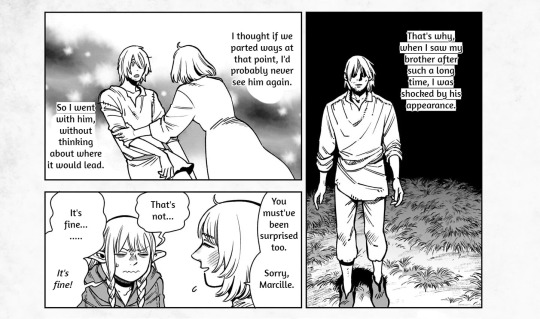
A friend always says that while Falin is the center of Marcille’s world, Laios’ is at the center of Falin’s, and I tend to agree.
It’s fun to think of how her career dreams had always been shaped by Laios, even when they were kids. Of course there’s how traveling the world began as a dream they talked about and shared, but there’s how he reassures her by listing cool jobs she could do like traveling exorcist, etc. And then of course, she gave up on her magic academy and career path to follow him and do odd jobs, etc etc.
I should go into the violence of Faligon more tbh, because I think there’s an interesting parallel to how she has no problem wacking things with a mace, wether a ghost when she was a kid or a walking mushroom as an adult. Something that often surprises fans when they remember, I don’t really want to get into the whole " Falin hates violence and hates seeing people in pain to an intense degree. ‘If you die do it somewhere where I can’t see’ style’ interpretation, it has some weight but on the whole I don’t vibe with the theory she has a particular aversion to violence, she seems to be fine resorting to it as much as any other adventurer as long as it isn’t needlessly against ghosts. And Falin’s sudden mace hits are fun to me too because it’s not her becoming a berserker when the need arises as much as her becoming active because something she cares about is threatened, and that brings her out of her passivity from 99% of the rest of the time. Thistle included. Falin always could be violent, she just dislikes senseless carnage. The Shuro party vs chimera fight is a bit ambiguous on it, because you can argue she only attached after being provoked, presumably offscreen as well while the ninjas went off to fight the harpies. Falin becomes the most active when she needs to protect someone, she has no qualms doing whatever’s needed for that, wether it be leaving the academy & Marcille without notice no matter the consequences or what her parents think, or teleporting the party, etc.
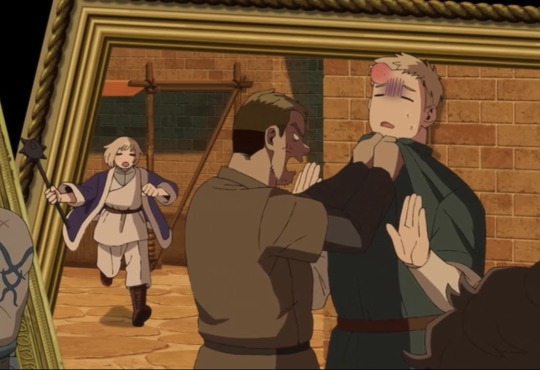
I’m working on a post specifically pointing out all the differences between Falin and Laios, but yes I think both of them selfishly desire freedom in different yet similar ways. Falin’s dark secret is "Ethics and risks are optional if it means I can protect those I love" like the teleportation, and Laios’ is "Ethics and risks are optional if I can be free of all this bullshit" aka humanity aka his wish with the winged lion.
Conclusion
Flighted birds have hollow bones. With freedom and wings there comes risks and sacrifices.
Tldr: Falin doesn’t care all that much, she’s very go with the flow. For example if someone hates her she doesn’t really care because that’d require her caring about what they think of her in the first place, and she only cares about her loved ones. She smiles, but it’s more a state of being rather than out of active goodness: she’s canonically very genuinely kind, but it’s more out of a general want for pleasantness than active care itself. She’s passive, and softspoken because that’s just how she seems, but she has no problem hopping into bushes or getting heated if something calls to her enthusiasm or calls for action and a hit of the ol’ mace. Her loved ones needing tending or protective is what makes her go from passive to active. That familiar autopilot mode of making someone the center of her world and following their every move is what made her so easy to be controlled as the chimera, even ferociously defending him with her life. Faligon is most interesting to me with the theme of freedom. She’s shackled to Thistle and out of her mind, but there’s also a sense of empowerment and freedom from expectations and society. She spends all her time caring for Laios and Marcille alternating that none of her care and emotional energy is left for others, including herself. So she had to get relieved of all of that for a bit, becoming the chimera so she could reset and recenter and remember that she, too, indeed, is there and an important part of her own life. There’s a way of caring after others that can be selfish, not unlike Marcille being overly coddling and not listening to Falin. In Falin’s case, I think it was so selfless that it ended up looping back around to erasing her sense of self. In losing sight of herself, that devotion becoming neither quite selfish or selfless but a fact of life and a state of nature, muddled by its lack of direction.
She’s sooo used to never being able to ask things out of others, you get the crumbs of affection and approval that others offer to you unprompted and that’s it don’t hope for more don’t ask for more. (Also reflected in how she follows her loved ones around without complain or personal opinions and how she’s not willing to rock the boat and affirm herself in her relationships like with Marcille during canon)
Falin cares so much, so much and so laser focused on her few loved ones that it blinds her and she loses sight of everything else, she ends up neglecting herself and the rest of the world. As Kui puts it, Falin is herself first and foremost. She just had to remember the importance of that.
-
I see her as an enneagram 9, which can be surprisingly accurate and fun to research through the lense of Falin. Excerpt below from this book, but like my god, good way to put it
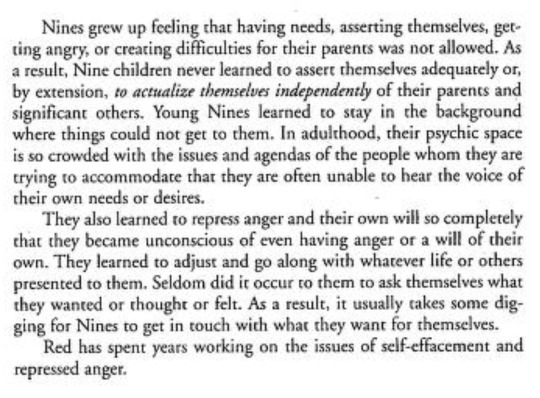
That’s it, ty for reading. Even if it’s a bit of a mess, hopefully you’ll have gained a thing or two from it. Falin is a character hard to pin down, but it is very gratifying when you find the way that the puzzle pieces fit together right for your own understanding of the story. Fantranslation of the shuro proposal comic by @/thatsmimi here.
Here’s my spotify playlist for her if you’d like
Sometimes love is about letting go, a lesson a lot of the cast needed to learn. Self-love’s important too, and just like with diets we need a healthy balance.
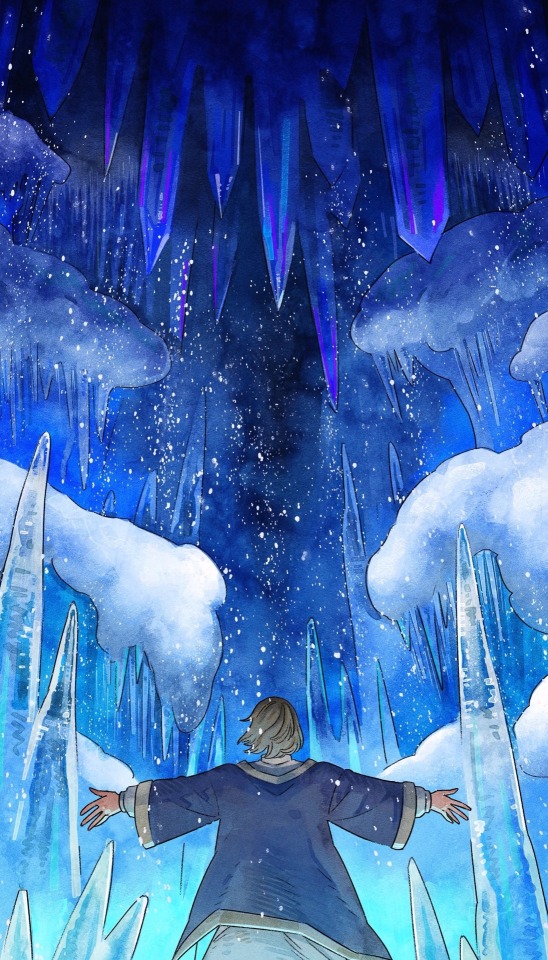
#I find it hard to express myself right on the topic of Falin. Both because the issue is pretty vibe based and because we don’t#get that many moments with her. So there’s ambiguous scenes up to interpretation addressing a layered topic and like. Save me. Save me#As always falling down the rabbithole of starting an analysis about a specific facet and then needing to explain everything else around it#I’m doomed. I’m getting lost in the sauce.#dungeon meshi#delicious in dungeon#falin touden#analysis#character analysis#meta#autistic reading#aroace reading as well. Sort of. It’s mentioned#The aroace autistic guilt of not caring back in the way/with the intensity you’re expected to#As always this is just my interpretation blablabla#Spoilers#dungeon meshi manga spoilers#She loves like a dog aka unconditionally and happy with eating scraps of affection and attention off the floor#Laios touden#he’s here too bc they are an unit#If you’re not capitalizing on the uncanny vibe autistic effect for Falin’s character u are missing an opportunity imo#Fairy’s child is written all over her. Her cryptic-ness is the point so why am I surprised she’s hard to fully pin down#Even with the graveyard scene it was Falin following Laios… Sob. Laios could feel responsible her powers were found out#I’d like to rework this at some point if i get better at structuring. I’m not satisfied by the level of clarity#Will 90% for sure edit stuff in if i find more to say.#Fumi rambles#Crazy style#I give a TLDR at the end if you’d prefer. It doesn’t have the like evidence/explanations alongside but it makes the main points i think
1K notes
·
View notes